
Na’aleh Presents 2024 Jewish Community Awards Chabad Silver Spring /JCC Lag Ba’omer The Hamas Chief and the Israeli Who Saved His Life ADI Negev The Never Never Land of Therapy 10 60 40 16 Over 5,800 Copies Printed | Over 11,500 Readers | www.thebjh.com S U N D AY , J U N E 1 6 , 2 0 2 4 Pikesville DoubleTree Doors Open 7:00pm • Program Begins 8:00pm Participate in an inspirational and captivating experience with S U R I J A R O S L A W I T Z THE WORLD-FAMOUS CHALLAH LADY Enjoy a Dairy Reception and Gala Chinese Auction Debuting our brand new AIM original music video sung by Aliza Loeb! BUY YO UR TICKETS! YAR Z E .IT/AIMAUCTION • 410.438. 124 6 LEARN MORE AT AIMBALTIMORE.COM Early Bird Pricing Ends June 3! Vol. 10 Issue #11 | May 30 - June 5 , 2024 | NOW A WEEKLY PUBLICATION! רייא ח״כ - ב״כ


2 THE BALTIMORE JEWISH HOME MAY 30, 2024 WWW.THEBJH.COM You heard it here first... The BJH will now be in your mailbox WEEKLY! Don’t receive in your mailbox yet? Sign up for FREE at thebjh.com! Stay informed with community and world news, community events, and exclusive features every week. Don’t miss an issue—your go-to source for all things local and Jewish is now more accessible than ever! Ask About Our Advertising Packages With Baltimore Jewish Life!

3 THE BALTIMORE JEWISH HOME MAY 30, 2024 WWW.THEBJH.COM
Dear Readers,
The Baltimore Jewish community is growing by leaps and bounds. New neighborhoods are blossoming, and schools and shuls are thriving. Remarkably, the community’s infrastructure comfortably supports this expansion. Baltimore’s small-town charm, coupled with the amenities of a big city, makes it an ideal place for families. But what’s the secret behind this balance? How has the Baltimore Jewish community preserved its unique qualities amid such growth?
I recently attended the H3 Halacha conference, organized by Rabbi Ariel Sadwin. This well-run event drew nearly 500 local businesspeople, all eager to deepen their understanding of businessrelated Halacha and Hashkafa. Various Rabbonim and leaders presided over sessions on their areas of expertise. The highlight for me was a Q&A forum featuring Rav Yaakov Hopfer, the Rav of Shearith Israel and head of the Vaad HaRabonim, and Rav Aaron Lopiansky, the Rosh HaYeshiva of YGW.
During the Q&A, a wide range of topics were discussed. The answers were insightful, but it was the manner of their delivery that left a lasting impression. Rav Hopfer’s responses showcased his profound sense of responsibility toward the community. Every answer reflected the sensitivity required to lead Baltimore’s kehilla. He balanced the diverse needs of the community, family and financial considerations, halachic and hashkafic implications, and the essential goal of maintaining
Shalom. Leading with such grace and sensitivity is a testament to his exceptional qualities.
Our community is fortunate to be guided by two esteemed senior Rabbonim. Rav Hopfer and Rav Moshe Heinemann have led us with wisdom and dedication for many years. It is no surprise that Baltimore has flourished under their guidance. Their leadership sets the tone for the entire community, inspiring us all. Similarly, Rav Lopiansky, with his broad knowledge base and equal levels of sensitivity, showed us how fortunate the Greater Washington community is to have such an esteemed and thoughtful leader.
May they be blessed with many more years of health and happiness as they continue to guide us to greater heights.
At the Baltimore Jewish Home (BJH), we have also benefited from Baltimore’s rapid growth. Our oncesmall paper now has a devoted readership, with close to 5,8-0 copies printed as we’ve expanded into Greater Washington. We are excited to announce that we will now publish the Baltimore Jewish Home every week! This new schedule will allow us to provide the most current news and information, and offer advertisers more frequent exposure. We hope this development brings even greater benefits to our community.
Wishing everyone a peaceful Shabbos.
Aaron Menachem
Send us your: community events, articles & photos, and mazal tovs to editor@baltimorejewishhome.com to be featured in coming editions!
4 THE BALTIMORE JEWISH HOME MAY 30, 2024 WWW.THEBJH.COM The Baltimore Jewish Home is an independent bi-weekly newspaper. All opinions expressed by the journalists, contributors and/or advertisers printed and/or quoted herein are solely their opinions and do not reflect the opinions of BALTIMORE JEWISH HOME, their parent company or affiliates, and may have been previously disseminated by them on television, radio, Internet or another medium. The Baltimore Jewish Home is not responsible for typographical errors, or for the kashrus of any product or business advertised within. The BJH contains words of Torah. Please treat accordingly. For ad submissions please email ads@baltimorejewishhome.com 443-990-1941 | www.thebjh.com
SEND US YOUR NEWS!
GET THE BJH DELIVERED TO YOUR MAILBOX! Scan QR code and fill out the form on the website. IMPORTANT NUMBERS Police & Fire 911 Hatzalah 410-358-0000 Shomrim 410-358-9999 NWCP 410-664-6927 Chaverim 410-486-9000 Misaskim 443-265-2300 Chesed Fund 410-340-1000 CONTACT INFORMATION Moshe Meir Rubin PUBLISHER editor@baltimorejewishhome.com Eliana Woodland LAYOUT Yitzy Halpern MANAGING EDITOR Michael Czermak ACCOUNT EXECUTIVE AMF Creative DESIGN Aaron Menachem Sarah Fried COPY EDITORS Contents COMMUNITY Around the Community 6 Greater Washington Community 14 GW Minyanim Guide 16 Community Calendar 36 Baltimore Minyanim Guide 37 JEWISH THOUGHT Rabbi Zvi Teichman 32 Torah Sparks 48 FEATURES ADI Negev The Never Never Land of Therapy 40 Celebratinf the Rashbi in Ramat Beit Shemesh 49 The Hamas Chief and the Israeli Who Saved His Life 60 HUMOR & ENTERTAINMENT To Raise a Laugh 38 Centerfold 50 Notable Quotes 52 Kids Coloring Contest 68 LIFESTYLES Parenting Pearls 35 Israel Today 39 School of Thought 42 Delving into the Daf 43 Mental Health Corner 44 Israel Today 45 Inspiration Nation 46 Dating Dialogue 56 Your Money 64 School of Thought 66 In the Kitchen 71 NEWS Global News 20 Israel News 26 That’s Odd 30



5 THE BALTIMORE JEWISH HOME MAY 30, 2024 WWW.THEBJH.COM CAUSEMATCH.COM/ALLYOUVEGOT
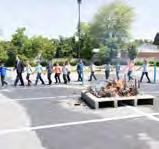









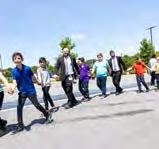





6 THE BALTIMORE JEWISH HOME MAY 30, 2024 Around the Community TA Elementary Lag B’Omer Bonfire Mazel Tov to TA Mesivta’s 10th grade on celebrating a Siyum on Mesechta Sotah together with Rabbi Yossi Flamm! Flower Delivery Club Join the • Free delivery every Friday • Starting at just $25/week Shelly’s Blossom Shop 410.961.4199 Ruby Lasker Designs



YOU CAN BE PART OF IT! YOU CAN BE PART OF IT! Klal Yisroel Is Coming Back. The Baltimore Community has already sponsored over 600 Kiruv children this year. Over $2,000,000 still needed to finish the school year. Change the future of a Kiruv child and their generations today for only $30 a month per child www.SaveChild.today 410.505.0058
Around the Community
Rav Hershkowitz Speaks at Yeshivas Toras Simcha
Rabbi Shragi Hershkowitz addresses the students at Yeshivas Toras Simcha on Pesach Sheini. The Rav discussed the mitzvah of Pesach Sheini. He explained that the people who were tamei on Pesach were unable to participate in the karban Pesach. They nevertheless sought to have the zechus of this mitzvah. So, they approached Moshe
rebeinu and asked if there was a way for them to have the zechus of the mitzvah. Moshe told them that he would need to ask Hashem, which did and we have the mitzvah of Pesach Sheini.
Rav Hershkowitz explained that even if these people had not made this inquiry of Hashem clearly there would have been another occasion where Moshe would have been instructed to

explain this mitzvah to Klal Yisrael. It was to the great merit of these people that the mitzvah was introduced because of their desire to be part of this mitzvah.
The Rav told the students that we all need to be on the lookout for opportunities to do mitzvos with our friends, family and others just like these righteous people who inquired about the mitzvah of karban Pesach.
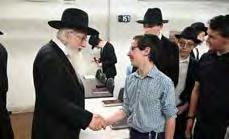



Yeshivas Toras Simcha Pirchei Weekly Learning

Pictured here is Rabbi Shai Scherer, Program Director at Yeshivas Toras Simcha, Rabbi Hillel Shepard, Menahel of YTS, Naftali Kraines 5th Grade and Daniel Herman 7th grade, both who won a Gorgeous set of Mikraos Gedolos from Pirchei National contest for learning Shnayim Mikra Vi-Echad Targum Contest weekly.
8 THE BALTIMORE JEWISH HOME MAY 30, 2024 WWW.THEBJH.COM
9 THE BALTIMORE JEWISH HOME MAY 30, 2024 WWW.THEBJH.COM
Na’aleh Presents 2024 Jewish Community Awards
Na’aleh: The Hub for Leadership Learning, an agency of The Associated: Jewish Federation of Baltimore will present four prestigious Jewish communal awards at its annual event, Na’aleh Celebrates: Lay and Professional Partnerships, on Tuesday, June 4 at Har SinaiOheb Shalom Congregation.
Mark Smolarz, Chief Operating and Financial Officer of The Associated received the Daniel Thursz Distinguished Jewish Communal Service

Award. This annual award recognizes an individual who has worked in the field of Jewish communal service for at least 20 years, serves the greater Baltimore community and demonstrates leadership and exemplary professional skills.

Jennifer Rudo, Coordinator of Wellness Programming and Mentoring at Jewish Community Services (JCS) received the Outstanding Jewish Communal Professional award for demonstrating exceptional promise and a commitment to a career in Jewish communal service.
Martha Goodman, Coordinator, Disability Resources at the Louise D.

and Morton J. Macks Jewish Connection Network received the Neely Tal Snyder Community Impact Award. This award honors the memory of Neely Tal Snyder z”l by recognizing a professional with a strong commitment and passion for Jewish community. The winner of this award has helped to build immersive and handson experiences/programs that have community impact and demonstrate creativity, openness and inclusion.
Ann Friedman, Clergy Administrative Assistant at Beth Israel Congregation received the Unsung H.E.R.O. Award. This award recognizes an “unsung” employee who goes above and beyond their typical daily job, to
care about the overall functioning of the organization and the people that surround them, and supports their organization with “Heart, Excellence, Reliability and Optimism.”
In addition to the award presentations, Na’aleh Celebrates: Lay and Professional Partnerships will recognize all the outstanding professionals and lay leaders serving our Jewish community, honor our Israeli Shlichim, and celebrate our achievements together.










































10 THE BALTIMORE JEWISH HOME MAY 30, 2024 WWW.THEBJH.COM
Community
Around the
Medical Expenses Simcha Expenses Home Repair Education Expenses Used Car Purchase Small Business Loans Temporary Crisis and much more. Giving you a HAND UP, not a hand out. Interest Free Loans for: HEBREW FREE LOAN ASSOCIATION OF BALTIMORE HELPING THE BALTIMORE JEWISH COMMUNITY FOR MORE THAN 120 YEARS. (410)843-7536 www.HebrewFreeLoan.org RUBY LASKER DESIGNS RUBY LASKER DESIGNS RUBY LASKER DESIGNS RUBY LASKER DESIGNS
NEW! BAMIDBAR
VOL. 1
BAMIDBAR-KORACH
COMING SOON:
BAMIDBAR VOL. 2
Chukas-Masai
“I studied the parashah with the new Elucidated Rashi... What a fantastic experience!”
“This
will becomesurely a classic.”

“It provides insights that even someone who’s been learning Chumash for decades will find novel.”
This new series will take you to a whole new level of understanding of the foremost commentary on Chumash
› An expanded translation and elucidation, drawing upon the major commentaries on Rashi.
› A short introduction to each Rashi.
› Notes discussing “What’s bothering Rashi?”
› Insights containing in-depth analysis of Rashi’s words.
› Explanations of underlying concepts and deeper looks where the commentators disagree with Rashi.
SERIES DEDICATED BY JAY AND JEANIE SCHOTTENSTEIN AND THEIR CHILDREN, JOEY AND LINDSAY, JONATHAN AND NICOLE, JEFFREY AND ARIELLA
ZICHRON HIRSCH WOLF EDITION OF SEFER BAMIDBAR DEDICATED BY MRS. RAQUEL WOLF AND THE DESSLER, WOLF, AND GINSBERG FAMILIES
COMING SOON: BAMIDBAR 2 - Chukas-Masai DEDICATED BY SIMCHA AND SHANI APPLEGRAD ALSO AVAILABLE: BEREISHIS COMPLETE IN 2 VOLUMES
11 THE BALTIMORE JEWISH HOME MAY 30, 2024 WWW.THEBJH.COM Available at your local Hebrew bookseller or at www.artscroll.com/setsale • 1-800-MESORAH (637-6724) Fallstaff Shopping Center 6830 Reisterstown Rd Baltimore Maryland 21215 Phone: (410) 358-2200 The Wisdom and Depth of RashiLike You’ve Never Seen Before!
NEW IN THE GROUNDBREAKING SERIES!
Around the Community
Memorial Day Kaddish Service 2024 Held at Garrison Forest Veterans Cemetery Honors Fallen Jewish Heroes
The Jewish Uniformed Service Association of Maryland and the Jewish War Veterans of Maryland Post 167 hosted a Memorial Day Kaddish Service at the Jewish Section in Garrison Forest Veterans Cemetery, one of the only such ceremonies in the country. Veterans, elected officials and community members attended the meaningful service.
The service was led by Chaplain Rabbi Chesky Tenenbaum, who read from Psalms, then the names of our Jewish fallen heroes were read followed by a Kel Molei and mourners Kaddish.
The service also paid tribute to former JWV MD commander and event organizer, the late COL Erwin Burtnick, who passed away this past November.
Comptroller of Maryland Brooke Lierman and Baltimore County Councilman Izzy Patoka, attended and offered words of encouragement and remembrance of our heroes.
May the memory of our Fallen Heroes be a blessing.
Lag B’Omer Around Baltimore






















12 THE BALTIMORE JEWISH HOME MAY 30, 2024 WWW.THEBJH.COM
ANTS RODENTS · MOSQUITO CONTROL · WILDLIFE · TICKS · BEES & WASPS www.QueenBPest.com • QueenBpest@gmail.com Call for your FREE Estimate M.H.I.C. #104396 M.D.A. # 30294 Live Pest Free. 410-989-1919 Yudy Brody GOOGLE GUARANTEED
“Tzipora worked with me to create a
regimen
and
is easy to maintain. She enabled me to cultivate a healthy lifestyle not only focusing on
but my relationship with food. Thank you Tzipora!”
ANONYMOUS CLIENT






"Tzipora was a pleasure to work with. She listened to my goals and challenges, and put together a workable game plan to achieve my goals. Highly recommend!”
ANONYMOUS CLIENT

13 THE BALTIMORE JEWISH HOME MAY 30, 2024 WWW.THEBJH.COM Say goodbye to generic meal plans and hello to empowering guidance. Together, we'll create a custom menu, shopping list, and tackle emotional eating with practical strategies. Tzipora Hastings, RDN Limited spots available Hybrid insurance packages available HSA/FSA eligible Exclusive Nutrition Coaching Packages Transform your life, not just your diet. tzipora@hastingsnutrition.com hastingsnutrition.com 410-205-6061
diet
balanced
exercise
that
diet,
Weekly progress check-ins for personalized feedback Bi-monthly virtual consultations Complimentary breakfast e-book and a selection of additional recipes Helpful handouts and guides to keep you on track Our Unique Approach Includes Personalized Menu Planning Shopping Advice Emotional Eating Support Behavior Modifications & Exercise Tips Lasting Healthy Habits
Greater
Washington Community
Chabad Lubavitch of Northern Virginia Hosts Lag B’Omer Celebration
Chabad Lubavitch of Northern Virginia partnered with over 10 local Jewish organizations including The Jewish Federation and Pozez JCC, for the annual Grand Lag B’Omer CommUNITY Celebration with a turn out of 300+ Jewish community Members.
The crowd enjoyed a Live band, Kosher BBQ, an award winning BMX bike stunt show and more!
Photos by Dr. Erica Statman









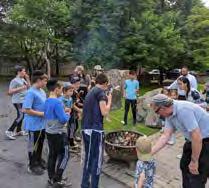
14 THE BALTIMORE JEWISH HOME MAY 30, 2024 WWW.THEBJH.COM




15 THE BALTIMORE JEWISH HOME MAY 30, 2024 WWW.THEBJH.COM
Greater Washington Community
Chabad Silver Spring/JCC Lag Ba’omer








Greater Washington Weekday Minyanim Guide
shacharis
6:15 am Young Israel Shomrai Emunah M-F
6:25 am Southeast Hebrew Cong., Knesset Yehoshua M-F
6:30 am Beth Sholom Congregation M-F
Beit Halevi (Sfardi) M, T
Chabad of Silver Spring M-F
Ohev Shalom Talmud Torah OLNEY M-F
Young Israel Shomrai Emunah S YGW M, Th
6:35 am Ohr Hatorah M, Th
6:40 am YGW S, T, W, F
Magen David Sephardic Congregation M-Th
6:45 am Beit Halevi (Sfardi) S, T, W, F
Kemp Mill Synagogue M, Th
Ohr Hatorah T, W, F
Young Israel Shomrai Emunah M, Th
6:50 am Woodside Synagogue/Ahavas Torah M, Th Silver Spring Jewish Center M-F
Chabad of Upper Montgomery County M-F
6:55 am Young Israel Shomrai Emunah T, W, F
7:00 am Kemp Mill Synagogue T, W, F
Southeast Hebrew Cong., Knesset Yehoshua S Silver Spring Jewish Center S
Woodside Synagogue/Ahavas Torah T, W, F
Young Israel Ezras Israel of Potomac T,W,F
7:05 am Kesher Israel M, Th
7:15 am Kemp Mill Synagogue M, Th
Kesher Israel T, W, F
Ohev Sholom Talmud Torah/The National Synagogue M-F
Ohr Hatorah S
7:30 am Chabad of DC M-F
Chabad of Potomac M-F
JROC M-F
Kemp Mill Synagogue T, W, F
Southeast Hebrew Cong., Knesset Yehoshua M-F
Young Israel Shomrai Emunah S Young Israel Shomrai Emunah (Sfardi) M-F
7:45 am YGW (Yeshiva Session Only) S-F
8:00 am Beth Sholom Congregation S
Kemp Mill Synagogue S Kesher Israel S Ohev Shalom Talmud Torah OLNEY S
Southeast Hebrew Cong., Knesset Yehoshua S
8:00 am Chabad of Upper Montgomery County S
Woodside Synagogue/Ahavas Torah S YGW (High School; School-Contingent) S-F
Young Israel Ezras Israel of Potomac S Young Israel Shomrai Emunah (Sfardi) S
8:15 am Ohr Hatorah S
Kehilat Pardes / Berman Hebrew Academy S-F Silver Spring Jewish Center M-F
8:30 am Chabad of DC S Chabad of Potomac S JROC S
Ohev Sholom Talmud Torah/The National Synagogue S Silver Spring Jewish Center S YGW (Summer Only) S-F
8:45 am Young Israel Shomrai Emunah S-F
9:00 am Chabad of Silver Spring S Kemp Mill Synagogue S
mincha/maariv Before Shkiah, S-TH
Beit Halevi (Sfardi)
Beth Sholom Congregation
Chabad of Potomac
Chabad of Silver Spring
Chabad of Upper Montgomery County
JROC
Kemp Mill Synagogue
Kesher Israel
Magen David Sephardic Congregation
Ohev Sholom Talmud Torah/The National Synagogue
Ohr Hatorah
Silver Spring Jewish Center
Southeast Hebrew Congregation, Knesset Yehoshua Woodside Synagogue/Ahavas Torah
Young Israel Ezras Israel of Potomac Young Israel Shomrai Emunah (Asheknaz) Young Israel Shomrai Emunah (Sefarhadi)
8:15
1:50 pm YGW Summer
2:15 pm Silver Spring Jewish Center M-F
2:20 pm YGW School Days
2:45 pm YGW S-Th
4:30 pm Ohev Shalom Talmud Torah OLNEY S-Th mincha
16 THE BALTIMORE JEWISH HOME MAY 30, 2024 WWW.THEBJH.COM
maariv
pm OSTT
SHC, Knesset Yehoshua M-Th
pm YGW
pm Silver Spring Jewish CenterFall/Winter
pm YGW Summer Silver Spring Jewish CenterSpring/Summer
pm Ohr Hatorah M-Th
pm YGW
(OLNEY) S-Th
8:45
9:00
9:30
9:45
10:00
BETHESDA Magen David Sephardic Congregation [S] 11215 Woodglen Dr, North Bethesda, MD 20852 GAITHERSBURG Chabad of Upper Montgomery County [Ari] 11520 Darnestown Rd, Gaithersburg, MD 20878 OLNEY Ohev Shalom Talmud Torah (OSTT) 18320 Georgia Ave, Olney, MD 20832 POTOMAC Beth Sholom Congregation 11825 Seven Locks Rd. Potomac, MD 20854 Chabad of Potomac [Ari] 11621 Seven Locks Rd, Potomac, MD 20854 Young Israel Ezras Israel of Potomac 11618 Seven Locks Rd, Potomac, MD 20854 ROCKVILLE Kehilat Pardes / Berman Hebrew Academy 13300 Arctic Ave, Rockville, MD 20853 JROC 11304 Old Georgetown Rd, Rockville, MD 20852 SILVER SPRING Beit Halevi [Sefardic] 1009 North Belgrade Rd., Silver Spring, MD 20902 Chabad of Silver Spring [Ari] 519 Lamberton Dr, Silver Spring, MD 20902 Kemp Mill Synagogue 11910 Kemp Mill Rd, Silver Spring, MD 20902 Ohr Hatorah 1009 Kersey Rd, Silver Spring, MD 20902 Silver Spring Jewish Center 1401 Arcola Ave, Silver Spring, MD 20902 Southeast Hebrew Congregation, Knesset Yehoshua 10900 Lockwood Dr, Silver Spring, MD 20901 Woodside Synagogue/Ahavas Torah 9001 Georgia Ave, Silver Spring, MD 20910 Yeshiva Gedola of Greater Washington (YGW) 1216 Arcola Ave, Silver Spring, MD 20902 Young Israel Shomrai Emunah [Ashk + S] 1132 Arcola Ave, Silver Spring, MD 20902 WASHINGTON Chabad of DC [Ari] 2110 Leroy Pl. NW, Washington, DC 20008 Kesher Israel 2801 N Street, NW Washington, DC 20007 Ohev Sholom Talmud Torah/The National Synagogue 1600 Jonquil St NW, Washington, DC 20012 For edits or additions email ads@baltimorejewishhome.com
We're Hiring!
Bais Yaakov is seeking a Personnel Director for our Early Learning Center (ELC)!
This role will report to the school’s Director of Operations and will work alongside the ELC Director to lead our Daycare Center. This is a new leadership role with the opportunity to help shape our Center’s operations.
Scope of Responsibilities include:
Day-to-Day staff management and support
Hiring and Retention
Parent Relations and Communication
Other management functions
Candidates should be:
Organized
Capable of managing a team
Strong communicators
Quick thinking
Have strong interpersonal skills
Come join us! Bais Yaakov offers competitive compensation and benefits and a positive work environment.
Interested candidates may apply by sending a resume to: positions@baisyaakov.net

17 THE BALTIMORE JEWISH HOME MAY 30, 2024 WWW.THEBJH.COM APPLY NOW






MAY 30, 2024 WWW.THEBJH.COM
The Week In News
The Week In News
age systems.
“Many people are stranded – it will be another long night ahead with millions not having electricity or shelter,” Bangladeshi climate expert Liakath Ali said. “And people having no idea of how damaged their homes, land and livestock are.”
Cyclone Pummels India

At least 16 people lost their lives this week when a major cyclone brought strong gusts of winds and heavy rain to the coastlines of India and Bangladesh, cutting power to millions of people.
The winds had not stopped as night fell on Monday, with water rising in many places and overwhelming drain-
Cyclone Remal is the first of the frequent storms expected to pound the low-lying coasts of India and Bangladesh this year.
Packing speeds of up to 135 kph, it crossed the area around Bangladesh’s southern port of Mongla and the adjoining Sagar Islands in India’s West Bengal late on Sunday, weather officials said, making landfall at about 9 p.m.
At least 10 people were killed in Bangladesh. People tend to stay in their homes with their livestock, reluctant to leave to shelters. Often, it’s too late when they actually decide to leave their homes.
State Minister for Disaster Management and Relief Mohibbur Rahman said the cyclone destroyed nearly 35,000 homes across 19 districts in Bangladesh. An additional 115,000
homes were partially damaged.
Some people died from electrocution from downed power lines due to the storm. As such, authorities in some states shut power to prevent more deaths and damage.
Nearly 3 million people in Bangladesh were without electricity. West Bengal authorities said at least 1,200 power poles were uprooted, while 300 mud huts had been razed.
About 800,000 people in Bangladesh were evacuated to shelters; roughly 110,000 in India were moved.
China, S. Korea, Japan Meet

Chinese, Japanese, and South Korean leaders met on Monday in Seoul for their first three-way talks in four years.
Chinese Premier Li Qiang praised what he called a restart in relations with Japan and South Korea. He was joined by South Korean President Yoon Suk Yeol and Japanese Prime Minister Fumio Kishida.
The three are adopting a joint statement on six areas including the economy and trade, science and technology, people-to-people exchanges, and health and the aging population.
At the summit, Li called for the comprehensive resumption of trilateral cooperation with an open attitude and transparent measures, China’s official Xinhua news agency reported.
He said relations between the three nations had not changed despite profound global transformations.
while Kishida and the Chinese premier discussed Taiwan and agreed to hold a new round of bilateral high-level economic dialogue.
Yoon also asked China to play a constructive role with its partners in North Korea, which is expanding its nuclear weapons and missile arsenal in defiance of United Nations Security Council resolutions.
The trade relationship between China, South Korea, and Japan has evolved over the past decade to become increasingly competitive. Those ties have been further tested by U.S. calls for its allies to shift their supply chains for key products, such as semiconductors, away from China.
UK MP Loses Hands and Feet

In an atypical display of unity, members of the United Kingdom’s parliament gave a standing ovation to conservative lawmaker Craig Mackinlay – who was in the hospital for six months due to sepsis, which caused him to lose his hands and feet and put him in a coma – as he walked into the House of Commons last Wednesday.
The 57-year-old legislator, who now has prosthetic hands and feet, declared that he would like to be called “the bionic MP” and has promised to support efforts to bring awareness to sepsis and to improve the UK’s National Health Service, which helped treat him, to support those who have lost limbs.

“Our meeting today, first in more than four years, is both a restart and a new beginning,” Li said, according to a post on X by China’s foreign ministry.
Monday’s summit comes a day after the leaders met separately for bilateral talks with each other.
In those meetings, Li and Yoon agreed to a diplomatic and security dialogue and resume free trade talks,
“As you know, we don’t allow clapping,” Speaker Lindsay Hoyle said, as Mackinlay’s wife and four-year-old daughter watched while sitting in the public gallery. “But this is an exception.”
During Mackinlay’s speech, he expressed his gratitude to Hoyle and to Prime Minister Rishi Sunak, who visited him in the hospital. He then requested that Sunak see to it that the health service “embed[s] recognition
20 THE BALTIMORE JEWISH HOME MAY 30, 2024 WWW.THEBJH.COM
410-929-2802 Saadya Cohen, Owner Repair and/or replace: Hot Water Tanks • Sump Pumps • Faucets • Toilets • Garbage Disposals • Instant Hots • Dish Washers • Dryers • Washing Machines • Light Fixtures • Switches • Dimmers • Outside Lighting • Fans • Timers • and more... Licensed • Bonded • Insured




21 THE BALTIMORE JEWISH HOME MAY 30, 2024 WWW.THEBJH.COM Sam Rosenblatt Sales Manager 410.375.4447 9711 Washingtonian Boulevard, Suite 550, Office 521 Gaithersburg, MD 20878 Sam@TheRosenblattGroup.com TheRosenblattGroup.com NMLS: 75844 DAS Acquisition Company, LLC dba USA Mortgage NMLS: 227262. Not a commitment to lend. Additional terms and conditions apply. Headquarters: 12140 Woodcrest Executive Drive, Suite 150, St. Louis, Missouri 63141, Toll Free: (888) 250-6522. For licensing information, go to: www.nmlsconsumeraccess.org. Interest rates and products are subject to change without notice and may or may not be available at the time of commitment or lock-in. Life Trsitis Life Trsitis CHANGE THE WAY YOU PLAN TO INVEST IN A HOME Whether you’re looking for your first home or moving in to your next home, a great mortgage planner understands that not everything in life is perfectly planned out. The Rosenblatt Group finds mortgage products that meet our clients’ needs today and provides solutions that bring you long-term financial security for the future. Contact Sam today.
The Week In News
of early signs of sepsis,” a life-threatening condition that can be triggered in the body as a result of a serious infection.
“If we can stop somebody ending up like this, I would say that is a job well done,” Mackinlay said, encouraging the health ministers to guarantee the “provision of appropriate prosthetics.”
Mackinlay was hospitalized on September 28. At one point, his skin was “bright blue” because blood was cut off from his limbs, he said. After having septic shock, Mackinlay was put into a medically induced coma. Doctors said he had a 5% chance of living. Sixteen days later, he woke up to find that his limbs felt “like plastic” and had become black, while his hands and feet were “desiccated, clenched, and drying,” he recalled.
“They managed to save above the elbows and above the knees,” Mackinlay said. “So you might say I’m lucky.”
Having represented the South Thanet district of southeast England since 2015, Mackinlay has announced his plans to run again in the next election.
Chinese Military Drills Around Taiwan

In a move designed to threaten Taiwan, the Chinese military has been conducting drills around the democratic island, following the swearing-in of Lai Ching-te, the new president of Taiwan, an experienced politician who has been hatefully branded by China as a “dangerous separatist” whose victory has thrust Taipei into “a dangerous situation of war.”
According to the Chinese Communist Party’s People’s Liberation Army, these recent exercises, which ramped up last Thursday, are meant to “test the ability to jointly seize power, launch joint attacks and occupy key areas” of Taiwan. As part of its drills last
week, the PLA, along with the Chinese navy, air force, rocket force, and coast guard, deployed warships and fighter jets around Taiwan and its territories as “a strong punishment for separatist acts of Taiwan independence forces.”
As part of the drills, which were conducted on Thursday and Friday, China’s Coast Guard was dispatched close to Taiwan’s outlying islands, including Kinmen, Matsu, Wuqiu, and Donguin. Nineteen warships and seven coast guard vessels were spotted approaching the Taiwan Strait by the island’s defense ministry, which also detected 49 Chinese aircraft from 6 a.m. Thursday to 6 a.m. Friday, 35 of which passed the Median Line, an unofficial mark that represents the border that China and Taiwan shares. The line has been, until the past few years, respected by the People’s Republic of China.
Although the Communist Party has never ruled the island, the party’s leaders have promised to eventually take control of Taiwan, with military action if necessary. One of Chinese President Xi Jinping’s top goals is “reunifying” mainland China and Taiwan. However, few citizens of Taiwan have interest in being governed by China.
The Defense Ministry of Taiwan has denounced the drills as “irrational provocations” and deployed its own forces in kind.
“[It is] regrettable to see China threatening Taiwan’s democracy and freedom and regional peace and stability with unilateral military provocations,” the presidential office of Taiwan said, adding that Taipei has the “confidence and ability to protect national security.”
“Taiwan is an isolated island, suspended in the sea with weak self-sufficiency. Taiwan’s economy is export-oriented, and most of its energy consumption relies on imports. Once besieged and blockaded, it can easily lead to economic collapse, turning it into a dead island,” said Chinese military expert Zhang Chi, who has claimed that the PLA’s recent drills are aimed at “practicing a new mode of blockading Taiwan.”
The Chinese military last launched military drills around Taiwan in August 2022 and April 2023.
According to the former director of the U.S. Pacific Command’s Joint Intelligence Center, Carl Schuster, these
drills will likely “become the norm” and may culminate with China eventually launching a real attack.
“These drills aid in blurring the lines between peace and war, so much so that future exercises could be used as a pretext for an actual invasion,” Craig Singleton, a senior China fellow at the nonpartisan Foundation for Defense of Democracies, pointed out.
Georgia’s Foreign Agents Bill

The country of Georgia has been grappling with protests over the past few weeks, as citizens continue voicing their disapproval of a potential foreign agents bill that could take away freedom from Georgian organizations.
The bill, which was vetoed by Salome Zourabichvili, the president of Georgia, would force organizations that obtain over 20% of their funding from foreign parties to register as “agents of foreign influence.” A simple majority in parliament could still push the bill into law despite the veto.
On May 14, the bill was initially approved by parliament. Although the people of Georgia have been largely against the bill, 84 parliament members voted in favor of it, while only 30 voted against. The ruling party Georgian Dream, which is behind the bill, alleges that the legislation would encourage national sovereignty and transparency. Others disagree.
“This law, in its essence and spirit, is fundamentally Russian, contradicting our constitution and all European standards,” Zourabichvili said following her decision to veto the bill.
Georgia, according to the U.S., has been unjustly suppressing protests against the bill, as officials fight against protestors. On Thursday, U.S. Secretary of State Antony Blinken announced a new visa restriction policy on “individuals who are responsible for or complicit in undermining de-
mocracy in Georgia, as well as their family members” and expressed his wishes that the parliament of Georgia rethink the bill.
“This includes individuals responsible for suppressing civil society and freedom of peaceful assembly in Georgia through a campaign of violence or intimidation,” stated Blinken, adding that the U.S. will, additionally, be reviewing its bilateral cooperation with Georgia.
In 2022, Georgia, a transcontinental country in Eastern Europe and West Asia, applied for membership in the European Union. The EU has since said that the passing of this foreign agents bill would immediately disqualify Georgia from joining the union.
N. Korean Spy Rocket Explodes

North Korea attempted to put a military reconnaissance satellite into orbit on Monday, the South Korean military said, but the rocket carrying the satellite exploded midair shortly after takeoff, marking the country’s third failed attempt to put a spy satellite into orbit.
Kim Jong Un, the leader of North Korea, has made deploying a fleet of spy satellites one of his latest military ambitions. He has also focused on testing what he claimed were nuclear missiles capable of targeting the United States and its allies in the Asia-Pacific region.
North Korea has said it needs satellites to increase its ability to monitor and target its enemies and to make its nuclear deterrence more credible.
After two failed attempts, North Korea placed its first spy satellite into orbit in November. Kim has said he would launch three more satellites this year. On Monday, North Korea said it would launch the first of the three before June 4.
Hours later, the South Korean mil-
22 THE BALTIMORE JEWISH HOME MAY 30, 2024 WWW.THEBJH.COM




23 THE BALTIMORE JEWISH HOME MAY 30, 2024 WWW.THEBJH.COM EST 1984 VISIT TOVPIZZAMENU.COM TO PLACE YOUR ORDER ONLINE DAILY MINCHA MINYAN AT 2:30PM 6313 Reisterstown Road Baltimore, MD 21215 Tov Pizza reserves the right to resolve all issues pertaining to its coupons. Special orders may incur a service fee at the discretion of Tov Pizza.
11:00-8:00 Friday: 11:00-2:00 Motzei Shabbos: 1 Hour After Shabbos-Midnight Pizza Kits! $25 Create Your Own Pizza Comes with dough, sauce, cheese and 2 toppings Perfect for Shavous! Fresh Salads Beat the heat and cool off with our freshly made salads! Greek or Caesar Plus! Salads by Sara Shavous Pasta Specials Baked Ziti 9x13 .......................$48 Mac N Cheese 9x13 ................$48 Eggplant Parmigiana 9x13 ......$50
Sunday-Thursday:
The Week In News
itary said it detected a rocket launched from the Tongchang-ri space station in northwestern North Korea. The rocket flew over the sea between the Korean Peninsula and China.
The South Korean military said the rocket was believed to be carrying a satellite. But it said it considered the launch to be a failure after detecting debris falling over North Korean waters two minutes after liftoff.
North Korea also confirmed that its launch was a failure, with the country’s state-run Korean Central News Agency reporting that its newly developed rocket booster carrying a military reconnaissance satellite had exploded in midair.
The United States, South Korea and Japan have been watching North Korean preparations for a rocket launch for weeks. By Monday, they had navy ships in waters around the Korean Peninsula to monitor the rocket and collect data, the South Korean military said in a statement.
North Korea is barred by U.N. Security Council resolutions from launching long-range rockets because they use the same technology needed to build intercontinental ballistic missiles.
North Korean satellites were once so rudimentary that they could hardly be considered reconnaissance tools. But more recently, North Korea has received satellite technology, as well as oil and food, from Russia in return for artillery shells and ballistic missiles to aid Moscow’s war effort in Ukraine, according to U.S. and South Korean officials. (© The New York Times)
Papua New Guinea Landslide

Papua New Guinea officials estimate that 2,000 individuals have died due to a landslide that hit the South Pacific country’s mountainous Enga province early Friday morning. Only five people have been found alive.
The landslide buried the Yambali village, where 3,895 people reside, according to Serhan Aktoprak, the chief of the International Organization for Migration’s mission in Papua New Guinea.
According to the International Organization for Migration, though, the death toll is 670 people, as of Sunday, pending new evidence.
“The land still continues sliding; therefore, it makes it very difficult to operate on,” said Aktoprak, adding that the three to four football fields’ worth of land had been covered.
The death toll has yet to be confirmed, and “given the scale of the disaster,” the number of recorded casualties may increase dramatically, said Aktoprak.
The impacted village is basically without water and power and is facing a food shortage, the chief added.
“Immediate needs are shelter, other non-food items (like) blankets and bedsheets, food, and drinking water,” he said.
Prime Minister James Marape said, “I extend my heartfelt condolences to the families of those who lost their lives in the landslide disaster in the early hours of this morning.
“We are sending in disaster officials, PNG Defense Force, and the Department of Works and Highways to ... start relief work, recovery of bodies, and reconstruction of infrastructure,” Marape added.
Determining the scale of the disaster is difficult because of challenging conditions on the ground, including the village’s remote location, a lack of telecommunications, and tribal warfare throughout the province which means international relief workers and aid convoys require military escorts.
Australian Foreign Minister Penny Wong expressed her country’s condolences to Papua New Guinea and said that “Australia stands ready to assist in relief and recovery efforts.”
According to Elizabeth Laruma, a women’s business association head in the town of Porgera, the landslide has blocked Yambali off from Porgera. The only way to get to the village now is by helicopter.
Papua New Guinea, which is home to 10 million people, hosts the second-largest population in the South Pacific. Australia, which is an ally and prominent financial supporter of Pap-
ua New Guinea, is the most populated country in the region and has a population of 27 million.
Just 1.66 million Papua New Guinea residents have internet access, with 56% of the country’s social media users living in Port Moresby.
Syrians Go on Hajj

Around 1.8 million Muslims around the world joined in last year’s Islamic Hajj pilgrimage to Mecca in Saudi Arabia. This year, for the first time in over a decade, Syrians were able to join the pilgrimage on a direct flight from Damascus to Saudi Arabia.
The flight on Tuesday included 270 Syrians. A second plane was set to depart from Damascus to Jeddah with more worshippers.
The development is part of an ongoing thaw in relations between Damascus and Riyadh, which days ago appointed Saudi Arabia’s first ambassador to war-torn Syria since severing ties in 2012.
Syria was readmitted to the 22-member Arab League in 2023, after it had been suspended from the group for more than a decade over President Bashar Assad’s brutal crackdown on anti-government protesters in 2011. Most countries in the Arab world have since restored diplomatic ties with Damascus.
The Hajj is scheduled to begin on the evening of June 14. It is one of the five pillars of Islam, and Muslims are required to undertake it at least once in their lives if they are physically and financially able to do so.
The civil war in Syria – now in its 14th year – has resulted in the deaths of nearly half a million people and displaced half of the country’s population of 23 million.
Uganda’s Fight Against Yellow Fever

Uganda, with a population of 45 million people, is hoping to eradicate yellow fever. The country has rolled out a nationwide vaccination campaign against the mosquito-borne disease that has long threatened so many. By the end of April, Ugandan authorities had vaccinated 12.2 million of the 14 million people targeted, said Dr. Michael Baganizi, an official in charge of immunization at the health ministry.
Uganda will now require everyone traveling to and from the country to have a yellow fever vaccination card as an international health regulation.
The country is giving the single-dose vaccine free of charge to those ages 1 to 60 in hospitals and clinics across the country. Beforehand, Ugandans usually paid to get the yellow fever shot at private clinics, for the equivalent of $27.
Uganda is one of 27 countries on the African continent classified as at high risk for yellow fever outbreaks. According to the World Health Organization, there are about 200,000 cases and 30,000 deaths globally each year from the disease.
Yellow fever is caused by a virus transmitted by the bite of infected mosquitoes. The majority of infections are asymptomatic. Symptoms can include fever, muscle pain, headache, loss of appetite and nausea or vomiting, according to the WHO.
Uganda’s vaccination initiative is part of a global strategy launched in 2017 by the WHO and partners such as the U.N. children’s agency to eliminate yellow fever by 2026. The goal is to protect almost one billion people in Africa and the Americas.
24 THE BALTIMORE JEWISH HOME MAY 30, 2024 WWW.THEBJH.COM


25 THE BALTIMORE JEWISH HOME MAY 30, 2024 WWW.THEBJH.COM Thursday Night out Is Back!!! This and Every Thursday 9 pm-12 am 4311 Old Milford Mill Rd ChulentKugel Chicken Bar Hot Pastrami 2 Types Kishka And Much Much More!!!!
The Week In News
Deadly Everest Season
High above the clouds on Earth’s highest peak, climbers are making the arduous trek up Mount Everest.
The narrow window of the spring summit season, which usually lasts from April to May, is the best time to climb. The weather is clearer and less windy, but that is no guarantee of safety: At least five people have died and three others have gone missing since the beginning of this climbing season, officials said.

The conditions have led to bottlenecks, and unnerving videos have circulated of long lines of climbers wait-
ing precariously on a precipice.
The popularity of the climb has prompted concerns in recent years that overcrowding, competition and inadequate vetting of rookie climbers are making it even more dangerous.
More climbers are feared dead.
Most climbers take on the mountain from Nepal, a process that involves a 10-day trek to base camp, weeks acclimatizing to the altitude, and an additional week to push to the summit.
But the journey is grueling. More than 300 people are known to have died on Everest, and an estimated 200 of their bodies remain there because they were too hard to retrieve.
Last spring set a grim record as 18 people died, according to the Himalayan Database, a mountaineering body, making it the deadliest year in recent record-keeping.
At least five people have died this year, Nepali officials confirmed, and the figure could rise.
A Nepali climber, Binod Babu Bastakoti, 37, died last Wednesday just
above a base for the summit attempt. A Kenyan climber, Joshua Cheruiyot Kirui, 40, also died Wednesday near the summit. Nawang Sherpa, a guide who was with him, remains missing.
A British climber, Daniel Paul Paterson, 40, and his Nepali guide, Pastenji Sherpa, 23, are missing after the collapse of an ice mound near the summit last Tuesday. A Romanian climber, Gabriel Viorel Tabara, 46, died in his tent, also Tuesday, at an advanced base camp.
Two Mongolian climbers, Usukhjargal Tsedendamba, 53, and Purevsuren Lkhagvajav, 31, died on May 13 while trying to summit Everest without supplemental oxygen and Sherpa guides.
Fewer permits were issued for climbers this year. Permits were issued to 421 climbers this year, compared with 478 last year. But it was difficult to say whether overcrowding had endangered climbers. (© The New York Times)
Norway to Recognize “Palestinian State”

Mohammed Mustafa, Palestinian Authority “prime minister,” said on Sunday, “Recognition means a lot for us. It is the most important thing that anybody can do for the Palestinian
26 THE BALTIMORE JEWISH HOME MAY 30, 2024 WWW.THEBJH.COM


27 THE BALTIMORE JEWISH HOME MAY 30, 2024 WWW.THEBJH.COM At Aventura, live each day with a meaningful and personalized experience. With strong community connections and our inviting atmosphere it’s everything you value about home only elevated. Beautifully Renovated Star K Kosher Dining Dynamic Activities Warm and Passionate Staff Reach out to Donna Wach at 443-380-1854 • dwach@aventurahg.com 7218 Park Heights Avenue, Pikesville, MD 21208 YOUR Home YOUR Neighborhood YOUR Friendships YOUR Place LIVING YOUR BEST AT AVENTURA AT THE HEIGHTS
The Week In News
people.”
The remarks were made in Brussels after Norwegian Foreign Minister Espen Barth Eide handed diplomatic papers to Mustafa in the latest step toward recognizing a Palestinian state.
Ireland and Spain pledged in concert with Norway last week to recognize a Palestinian state. Mustafa also met Spain’s Foreign Minister Jose Manuel Albares and EU foreign policy chief Josep Borrell on Sunday. He met with foreign ministers of European Union nations and high-level EU officials on Monday to drum up support for the Palestinians.
Norway is not part of the EU.
During his meeting with Spain’s Albares, Mustafa said the Palestinians “want to have every country in Europe to do the same,” adding that recognition of a Palestinian state addresses “the injustice that has been inflicted on the Palestinian people for decades.”
“We hope that this momentum of recognitions and initiatives will continue,” Mustafa added.
The Spanish foreign minister said that recognizing a state of Palestine “is justice for the Palestinian people [and] the best guarantee of security for Israel.”
Before meeting with Mustafa, Borrell said on Sunday that a “strong” Palestinian Authority is needed to bring peace in the Middle East.
“A functional Palestinian Authority is in Israel’s interest too, because in order to make peace, we need a strong Palestinian Authority, not a weaker one,” Borrell said.
Around 140 countries — more than two-thirds of the United Nations — recognize a Palestinian state but a majority of the 27 EU nations still do not. Several have said they would recognize it when the conditions are right.
Belgium, which holds the EU presidency, has said that first the Israeli hostages held by Hamas need to be freed and the fighting in Gaza must end. Some other governments favor a new initiative toward a two-state solution.
Spain Recognizes “Palestinian State”

Due to Spain’s recognition of the “State of Palestine,” Foreign Minister Israel Katz, on Friday, announced that the Spanish consulate in Jerusalem would now be banned from providing services to West Bank Palestinians.
“I have decided to sever the connection between the Spanish mission to Israel and the Palestinians and to prohibit the Spanish consulate in Jerusalem from providing services to Palestinians from the West Bank,” stated Katz.
Katz also condemned Yolanda Díaz, the Labor and Economy Minister of Spain, for declaring, “Palestine will be free from the river to the sea,” an antisemitic phrase that calls for the elimination or removal of Jews from Israel in exchange for another Arab country that spans from the Jordan River to the Mediterranean Sea. The Israeli foreign minister noted that if “this ignorant hate-filled person wants to truly understand what radical Islam wants, she should learn about the 700 years of Islamic rule in Al-Andalus — modern-day Spain.”
Since October 7, when Hamas murdered more than 1,200 people and abducted 252 others, Israel and Spain’s relations have been strained. In November, Pedro Sanchez, the prime minister of Spain, expressed “serious doubt” about the lawfulness and legitimacy of Israel’s war in Gaza, which prompted then-foreign minister Eli Cohen to recall Israel’s ambassador and summon Spain’s ambassador to Israel for a reprimand.
On October 16, Sira Rego, the Youth and Children Minister of Spain, said that Palestinians reserve the “right to resist after decades of occupation” and demanded that “the entire Israeli diplomatic delegation” be kicked out of Spain.
Last Wednesday, Spain, Ireland, and Norway stated that they would recognize an independent Palestin-
ian state, prompting Israel to recall the ambassadors for immediate consultations. On Thursday, the Foreign Ministry played footage of a female IDF soldier getting kidnapped on October 7 for the ambassadors of Spain, Ireland, and Norway to “underscore to them what a twisted decision their governments made,” said Katz.
The Kan public broadcaster reported that the Israeli government is also thinking about excluding the three countries from briefings.
IDF Investigates Rafah Strike

On late Sunday, an IDF airstrike in western Rafah killed two top Hamas terrorists, including the terror group’s West Bank commander. But according to Israeli officials, many Gazan civilians were mistakenly killed in the strike despite Israel’s efforts to prevent civilian casualties.
“Despite our efforts not to hurt them [the civilians], there was a tragic mishap. We are investigating the incident. For us, it’s a tragedy; for Hamas, it’s a strategy,” said Prime Minister Benjamin Netanyahu. “I don’t intend to end the war before every goal has been achieved. If we give in, the massacre will return. If we give in, we will give a huge win to terror, to Iran.”
According to the IDF, the attack was conducted in accordance with “intelligence information on the presence of the terrorists in the area.” Additionally, prior to the strike, “many steps to reduce the chance of harming uninvolved [civilians], including aerial surveillance, the use of precision munitions, and additional intelligence information” were taken.
“Based on [these steps] it was estimated that no harm was expected to uninvolved civilians,” the military said, adding that the strike was not carried out in the designated “humanitarian zone” where Palestinians have been ordered to evacuate.
According to one source, the IDF used two missiles with a “reduced in size” warhead to specifically hit terrorists.
On Monday, the army said that the General Staff Fact-Finding Assessment Mechanism would be investigating the incident. On that same day, military advocate general Maj. Gen. Yifat Tomer-Yerushalmi said the Rafah airstrike was “very grave” and “still under investigation.” She added that “the IDF regrets any harm to noncombatants during the war.”
Tomer-Yerushalmi added that Hamas, “an enemy that abuses and harms even its own people,” is “cynically taking advantage of the law, while brutally using the civilian population as human shields,” while Israel, on the other hand, is engaged “in a war it did not choose.” She also condemned South Africa’s genocide charges at the International Court of Justice and the efforts of the International Criminal Court’s chief prosecutor to issue arrest warrants for Netanyahu and Defense Minister Yoav Gallant.
“There is no other country in the world that can be as proud of its commitment to examine compliance with the rule of law, in the midst of an existential war,” Tomer-Yerushalmi said of the Jewish state.
She added that the Israeli military’s dedication to acting justly “does not stem from the fear posed by the international arena. It stems, first and foremost, from the fact that the State of Israel is a country of laws. The rule of law, and the purity of weapons, are values woven into the IDF’s code of values from the day it was established.”
Nikki Haley Visits Israel

Israel is fighting against the enemies of the United States in a war orchestrated by Iran, helped by Russian intelligence and funded by money
28 THE BALTIMORE JEWISH HOME MAY 30, 2024 WWW.THEBJH.COM










29 THE BALTIMORE JEWISH HOME MAY 30, 2024 WWW.THEBJH.COM Call the Columbia Group for a Quote Today! P: 410.483.8888 www.thecolumbiagroup.net
Using Humor to Cope with Stress
THE COLUMBIA GROUP PRESENTS:
The Week In News
from China, said Nikki Haley, former U.S. ambassador to the United Nations and governor of South Carolina, in Israel on Monday.
A former Republican presidential candidate known for her stalwart support for Israel, she spoke during a solidarity visit to communities near the Gaza Strip and just days after announcing that she would be voting for former President Donald Trump in November’s election.
Haley said that the nearly-eightmonth-old Israel-Hamas war cannot be fixed with a political agreement because an entire generation of Palestinians is steeped in Hamas ideology – something that needs to be changed for progress to move forward.
“Don’t listen to media bites that you hear,” she said at the site of Sderot’s former police station, which was destroyed in a battle after Hamas invaders holed up inside in October. “America is with you.”
After a tour of Kibbutz Nir Oz and the site of the Supernova music festival in the desert, which has been turned into a makeshift memorial, Haley called the cross-border attack on Oct. 7, when terrorists killed more than 1,200 people and abducted 252 others to Gaza, “one of the most brutal massacres” she has ever seen.
“What happened on October 7 is pure evil and can never be forgotten,” she said.
“Imagine if this happened in America on a Sunday. What would we feel? What would be going through? We wouldn’t stop and we wouldn’t let it go.
“If we say ‘never again’ we have to be truthful: These are all murderers and accomplices,” Haley said after listing Iran, Russia and China.
Knesset member Danny Danon, who was Israel’s ambassador to the United Nations during Haley’s tenure there, accompanied her on the tour.
“If we will not destroy Hamas and continue this war, they will do it over and over again,” he said.
“I tell my Israeli friends that we should take Hamas at their word” when it says it intends to repeat October 7 over and over again, Haley responded.
“We need your moral clarity. We want your voice to be heard,” he told her.
Haley continued, “I thought I had
seen it all at the U.N.,” calling the recent anti-Israel rulings by international courts in The Hague “disgusting.”
“I would have walked out,” she said of the moment of silence the world body recently marked for the Iranian President Ebrahim Raisi, who died in a helicopter crash on May 19. And of the pro-Hamas protests on U.S. college campuses that took place throughout the spring: “Arab money is funding our colleges. We need to get foreign funding out of the country.
“There is no gray areas between Iran and Hamas, and freedom-loving countries who want peace,” Haley said. “So pick a side. I know which side I am on.”
During a desert heat wave, with temperatures touching the century mark, Haley walked through the destroyed homes at Nir Oz, where one in four residents was either killed or abducted.
She then toured the nearby music festival site, where more than 300 people were murdered on that fateful Shabbat. The ambassador said it made her think of her own children.
“This story is not told [enough],” Haley said. “You can’t walk through that [the festival site] without feeling a tremendous amount of emotion.” (JNS)
“Bette inspired generations of flight attendants. Fly high, Bette.”
Bette began her career at the age of 21 with Eastern Airlines, working on its shuttle flight between Washington, D.C., where she lived, and Boston. This route allowed her to spend every night at home. She had intended to move on after a few years, but ended up staying, becoming a familiar sight to frequent flyers on the route long after it was taken over by American Airlines. She never officially retired from her post.
Bette was initially interested in serving as a flight attendant because she saw the glamour in flying.
“I wanted to be a flight attendant from the time I got on the first airplane – I was 16 years old,” she once told CNN. “The pilot and the flight attendant walked across the hall and I thought, ‘Oh my G-d,’ and I said that was for me.”
Things were different when Bette started. Years ago, flight attendants had to maintain a certain weight, based on their height. “It used to be horrible,” she observed. “You put on a few pounds and you had to keep weighing yourself, and then if you stayed that way, they would take ya off the payroll!”
As for the passengers flying with Bette for so many years, “The people are exactly the same,” she said back in 2017. “Everybody needs a little love.”
Bette, you have reached your final destination.
Fly High Bette

Bette Nash is now in a better place. The 88-year-old passed away last week. She is best known for being the world’s longest-serving flight attendant – after serving nearly 70 years in the skies.
American Airlines said, “She started in 1957 and held the Guinness World Record for longest-serving flight attendant.
Hail and Heat

Mexico is experiencing a heatwave, with temperatures hitting 113 degrees Fahrenheit in some areas. But the residents of Puebla were treated to an astonishing sight last week.
A surprise hailstorm had hit the area, with piles of ice and hail blocking roads and streets. For thirty minutes on Friday, bits of ice and snow pummeled the town.
The hail accumulated up to several feet in some areas, knocking down trees. Residents were forced to shovel
the ice and mud as they looked around in amazement at the weather phenomenon that the city encountered.
Sounds like the weather is blowing hot and cold in this town.
Fine Feathers
We’re not ones to tell people how to spend their money, but this seems like a bird-brained idea.
A New Zealand auction house said a single feather from an extinct huia bird became the most expensive feather in the world when it sold for $28,417.
The auction house had expected the specimen to sell for around $1,800 but then prices started soaring.
The huia bird was considered sacred by the Māori people, and their feathers would adorn the headpieces of chiefs and their families. The last confirmed sighting of a huia bird was in 1907, although unconfirmed sightings were reported over the course of the ensuing 30 years.

“We are very pleased that this rare item of natural history has achieved such huge bidder interest, highlighting the fragility of our ecosystem and the importance of looking after its fauna,” Leah Morris, head of Decorative Arts at Webb’s Auction House, said.
According to Morris, the feather was in “wonderful condition” with a “very distinct sheen” and “no insect damage.”
The previous record was set by a feather from a bird of the same species when it sold for $5,150 in 2010. Sounds cuckoo to us.
30 THE BALTIMORE JEWISH HOME MAY 30, 2024 WWW.THEBJH.COM
Join the BJL WhatsApp!
By Baltimoreans for Baltimoreans


31 THE BALTIMORE JEWISH HOME MAY 30, 2024 WWW.THEBJH.COM
Torah Thought Something From Nothing
 By Rabbi Zvi Teichman
By Rabbi Zvi Teichman
We are told of the terrible consequences that will befall our nation in the event we begin to loath and reject G-d’s will. We are assured that the ensuing travails will eventually bring us back to our senses and only ‘then will their unfeeling hearts be humbled’, taking ownership for our actions, confessing our sins, and achieving appeasement for having strayed. )במ-אמ וכ ארקיו( Rabbeinu Bechaye as well as Rav Avraham, the son of the Rambam, point out the centrality of the attribute of humility as key to success in all our spiritual endeavors.
Those wise in the ways of the secrets of Torah reveal that in the condition of, ‘If my decrees תלכו—you will follow’, that all of G-d’s blessing is
contingent on—is mystically embedded this vital ingredient. The word תלכו being an acronym (in reverse) for a sentiment we express three times a day. ונפשי כעפר לכל תהיה—and let my soul be like dust to everyone.
It is our only hope in attaining our true goals in life.
Rebbi Levitas of Yavneh encourages us to ‘Be exceedingly humble in spirit, שתקות אנוש רמה for the ‘hope’ of man is worms.’ (אבות ד ד)
Hope? Being consumed by worms may be mortal man’s inevitable destiny, but in what way does this express hope?
Arrogance is man’s feeble attempt to portray oneself as the creator of one’s own fate. One who sees oneself as totally subjected to the will of G-d,
however, conscious of the inability to determine the outcome of any effort to produce results without G-d so willing it, will never attribute success to one’s own strength.
The more we submit our material selves to His direction, the more we suffuse our being with His presence.
To those, however, who seek to supplant His role, G-d declares to them, “I and him cannot dwell within the same world!”
The greater the display of our awareness that indeed we are ‘like dust to everyone’, the lesser the need for the reduction of our physical presence by worms. That reality represents a process of refinement that must transpire after we expire that we must endure, so that we can be rewarded for our efforts towards perfection we did achieve in our lifetimes.
So indeed, it is truly our only hope in sensing the joyous cleaving to His
presence for eternity. But we can mitigate that difficult and painful transformation proportionate to the way we ‘dust off’ our ego and behave with genuine humility during our lifetime.
Have you ever observed how truly humble people connect with others more easily? They are more forgiving, tolerant and appreciative of others?
The haughty on the other hand have difficulty in their relationships. They harbor resentment, exhibit impatience and are either disinterested in others at best or downright cynical towards them at worst.
The modest are calm and rarely get angry while the snooty are always on edge and often raging about any given circumstance.
The unassuming are generally open-minded and eager to learn from others in contrast with the conceited who think they know it all and are skeptical of others who possess greater wisdom and experience than them. Those who live without pretension can deal more effectively with

32 THE BALTIMORE JEWISH HOME MAY 30, 2024 WWW.THEBJH.COM
20+ Years Experience Building YourDrea m s ni ytilaeR RESIDENTIAL & COMMERCIAL CELL: 443.925.4730 OFFICE: 410.320.0214 Yaron (Ron) Peretz rpshomeimprovementsllc@gmail.com References Available • Free Estimate Like us on RPS HOME Improvements Additions • Kitchens Basements • Bathrooms Plumbing • Flooring Painting • Masonry Stone • Brick SERVICES: CHECK OUT OUR NEW WEBSITE: RPSCONSTRUCTIONINC.COM | FULLY LICENSED & INSURED MHIC# 131496 PLAN DESIGN BUILD
FIT A BIT OF TORAH INTO YOUR LIFE.

33 THE BALTIMORE JEWISH HOME MAY 30, 2024 WWW.THEBJH.COM
TO JOIN... TOGETHER TO L EARN,TOASPIRE , TOCON N ECT am k e adifference insomeone 's l i f e Become a mentor CHANGE A LIFE
anxiety, disappointment and loss as opposed to the presumptuous who are plagued by fears, letdown and deprivation.
Rebbi Levitas chose the term אנוש in referring to ‘man’s’ hope from among many other more frequently utilized words to describe man, such as אדם or איש
אנוש/Enosh, was a grandson of Adam in whose days man began to turn to idolatry, descending into its powerful tentacles. The seeds of idolatry began with an arrogant attitude of self-determinism, where man sought to deny allegiance to a Creator choosing instead to turn to other forces, attempting to shackle their power for his personal needs and wants.
The Midrash records how in the days of Enosh the very nature of the world changed in four ways:
The fertile soil on the mountains transformed into rocky terrain; deceased bodies began to rot; people’s faces became like those of apes; people became diseased being susceptible to demons.
The famed disciple of the Baal Shem Tov, Rav Yaakov Yosef of Polonne, suggests that the mountains turning rocky is a metaphor for the inability of those arrogant leaders, who squander their flourishing crops, stonily hoarding their bounty, not sharing with others, incapable of relating to them and totally insensitive to their needs.
The ‘rotting of the flesh’ indicates the consuming jealousy and anger that erupts from those so absorbed with self, who literally ‘eat themselves up’ with frustration.
The depiction of their faces as apes represents their monkey like behavior, gazing at us without any desire, interest, or ability to truly comprehend what we are saying. Society became a ‘planet of apes’ void of a willingness to hear what the other might have to say.
The demonic sicknesses refer to the emotional demons that plague our psyche, the imagined fears and feelings of unworthiness that paralyze us from moving forward.
Those who live inspired, humbly dedicating themselves to the will of G-d without any expectation or sense of entitlement, being generous in their acceptance and appreciation of others, will live in a state of serenity and satisfaction.
One of the blessings for those who ‘follow His decrees’ is ‘You will eat your bread to satiety’ )שם שם ה(
The Degel Machaneh Ephrayim quotes his Zaida, the holy Baal Shem Tov, in a magnificent interpretation of verse in Psalms (22 27) that states: Eat will the humble and they will be satisfied.
The Talmud quotes Eliyahu HaNavi as instructing how ‘one should eat a third of what his stomach can hold, drink the same amount, and leave a third empty just in case he gets angry, his stomach will have room to handle it. )גיטין ע.(
Anger is a product of arrogant attitudes. Humility breeds calm. One who is humble can therefore eat to satiation for his bile will never rise!
His grandson adds that this is the

objective of our verse. The Torah is not emphasizing our ability to fill our bellies but rather teaching us that those who attain true humility will live a calm and peaceful life, able to cherish a relationship with G-d and his fellow man without distraction.
G-d also promises, ‘I will provide peace in the land’. Rashi adds the famous adage, that one can be blessed with all sorts of successes, but if אין שלום—there is no peace, אין כלום there is nothing.
The Tzemach Tzadik interprets this phrase creatively. אם אין שלום—if you are wondering why you have no peace in your life, the answer is, אין כלום—you haven’t yet mastered the attribute of humility and the sense that you are כלום—’nothing’ on your own, without His input.
May we slough off our arrogant attitudes and fully embrace G-d and our fellow man. We can only become a significant ‘something’, to ourselves and for others, if we first realize we are truly ‘nothing’ without Hashem.





34 THE BALTIMORE JEWISH HOME MAY 30, 2024 WWW.THEBJH.COM
Licensed Bonded Insured #253895 24/6 Emergency Services Immediate Response CALL IMMEDIATELY TO BE SAFE AND DRY! ◦ Call us before you call your insurance company ◦ Our experts will help make the insurance process ◦ smooth and easy ◦ We work with all major insurance companies ◦ We take care of all paperwork CELL: 443.925.4730 | OFFICE: 410.320.0214 info@rpsrestoration.com | A division of RPS Home Improvements LLC
Parenting Pearls A Chart for Your Star
By Sara Rayvych, MSEd
When two of our children had challenging therapies – one educational and the other medical – we struggled to get them to cooperate. They were very resistant to the therapies until they saw that box of Playmobil walk through the door. They immediately wanted to know how they could earn it. We had tried many methods, but ultimately, the old-fashioned star chart was what motivated them. We were fortunate that two problems were solved with a single solution.
Many hesitate, concerned that rewarding children too much will spoil them or hinder their internal motivation. While it is important to develop internal motivation, that breakthrough may take years. While it would be wonderful for children to do everything l’shma, it’s an unrealistic expectation. Star charts are one of many tools parents and educators can use to encourage children to do difficult tasks. Not everything children do requires a prize, treat or party, but there is a place for occasional rewards in the parenting toolbox.
It can be very challenging to get children to do hard things, and parents can feel helpless in getting their child’s cooperation. Having a few options available can assist parents, especially when the necessary task is important for the child’s health and development.
No prize can replace parental praise and acknowledgement of their accomplishments. More than the treat, they want to hear what a great job they did and how much you love them. Affection and encouragement should accompany each star they receive, and that may be what is ultimately the most meaningful part to the child.
Prize charts also provide some benefits for children. When used in healthy moderation, it can contribute positively to their overall emotional development. In a society that is ever increasingly depen-
dent on immediate gratification, there is a strong need for children to learn to delay gratification and to work towards a longer term objective. Rather than be rewarded each time they do an event, children grow from pushing themselves daily, knowing the prize only comes at the end. Children also learn to value that which they had to work towards. They may be careless with something they received easily, but they will treasure that which they toiled for. They can begin to appreciate the items they have and to learn responsibility for their property.
The Chart
The chart should be easy to read; being colorful or fun is an added bonus. You can use stars, stickers, smiley faces or any marking to show your child’s accomplishments. Children may find it rewarding to add the sticker to the chart themselves.
From the beginning, it should be clear to the child what they need to do to get a mark on their chart. It’s incredibly frustrating for everyone when the child assumes they’ve earned the next star but the parent disagrees. This can cause major arguments and potentially derail the entire project. For example, perhaps parents make a chart to encourage their struggling child to review their Chumash work nightly. Is it based on the time spent reviewing or the number of pesukim? Do they need to acquire a certain level of proficiency or is the time spent sufficient, even if they don’t fully understand? The requirements should be clear – writing it down is even better.
It’s also crucial for all parties to understand when that prize will be awarded. How many marks do they need to earn? Is the prize waiting for them or will it only be ordered once they finish their chart? Is it a toy of a certain monetary value or a specific item, such as a particular Lego or Playmobil model?

Think of it as a type of business deal. In business, all parties make sure they have a contract and clear guidelines for what is expected of each side. While you should definitely be friendlier towards your child than you would a business partner, the idea of mutually understood expectations is similar. You would be surprised how much frustration develops when parent and child misunderstand each other. It also helps to remember that the other party in this agreement is much younger and less emotionally developed.
It’s important to strictly stick to your part of the deal. A child takes a parent’s word seriously, and they have very long memories for these infractions. We risk losing some of their trust if we don’t keep every single thing we agreed to.
Pick Your Prize
Prizes should be something the child wants and the parent approves of. While this sounds obvious, sometimes parents choose something they themselves like but doesn’t interest the child. Alternatively, parents may permit a child to work towards a reward that is contrary to their family’s hashkafos or personal standards. It can be challenging to gauge the level of reward a child should earn. The prize should be something big enough to motivate them, but not excessive for the amount of effort the child will have to do. Bigger isn’t necessarily better.
The prize also needs to appropriately match the effort necessary to complete the tasks. A harder, or more involved job, will naturally deserve a larger prize. We need to judge the effort based on the
child’s abilities and bring our expectations to match. For example, the same task may be far harder for a younger child than an older one. A job that is minimal effort for a teen may require a great deal of work for a younger child to complete, and the prize should recognize that.
The time to earn the prize should match the child’s development and temperament. For example, younger children are often unable to delay gratification as long as an older child. An older child may be capable of waiting weeks before earning their treat, while a few days may be sufficient for someone much younger. Very young children may benefit more from smaller prizes or stickers along the way than from only a big one at the end.
As a general rule, I don’t advise taking away stars once they’ve been earned. Using the struggling Chumash learner above, failing to study tonight shouldn’t cause the child to lose a star from yesterday. The resulting negative feelings can be very upsetting for a child.
Like adults, children require motivation at times. There are so many ways to encourage a child to push themselves a bit further, and star charts are just one example. Ultimately, it’s our love for them and encouragement that will help them understand how far they can reach.
Sara Rayvych, MSEd, has her master’s in general and special education. She has been homeschooling for over 10 years in Far Rockaway. She can be contacted at RayvychHomeschool@gmail.com.
35 THE BALTIMORE JEWISH HOME MAY 30, 2024 WWW.THEBJH.COM
36 THE BALTIMORE JEWISH HOME MAY 30, 2024 WWW.THEBJH.COM SundayMondayTuesdayWednesday Thursday FridaySaturday 26 27 28 29 30 31 1 2 3 4 5 6 7 8 9 10 11 12 13 14 15 16 17 18 19 20 21 22 23 24 25 26 27 28 29 Iyar/SivanMay/June 2024 Community Calendar To have your future event listed in the Community Calendar please contact Ads@BaltimoreJewishHome.com SundayMondayTuesdayWednesdayThursdayFridaySaturday Iyar 18 Iyar 19 Iyar 20 Iyar 21 Iyar 22 Iyar 23 Iyar 24 Iyar 25 Iyar 26 Iyar 27 Iyar 28 Iyar 29 Sivan 1 Sivan 2 Sivan 3 Sivan 4 Sivan 5 Sivan 6 Sivan 7 Sivan 8 Sivan 9 Sivan 10 Sivan 11 Sivan 12 Sivan 13 Sivan 14 Sivan 15 Sivan 16 Sivan 17 Sivan 18 Sivan 19 Sivan 20 Sivan 21 Sivan 22 Sivan 23 Next BJH Issue Next BJH Issue Next BJH Issue רבדמב תשרפ 8:09 PM 8:17 PM 9:16 PM 9:21 PM 9:25 PM Zmanim are courtesy of MyZmanim and are for the 21209 area. Havdalah Zmanim are at 40 minutes past Shkiah. 8:19 PM 9:27 PM 8:13 PM חלש תשרפ אשנ תשרפ ךתולעהב תשרפ יתקחב תשרפ 8:19 PM 9:27 PM 8:15 PM 9:23 PM 9:23 PM תועובש ברע תועובש תועובש OJBA Builders Meetup see page 18-19 שדוח שאר JFood Show TA Annual Campaign see page 5 Mesorah Shavuos Shuir see page 9 Dirshu Event AIM Event see front cover The Mir Community Shabbos see back cover Omer: Day 33 Tonight Count 34 Omer: Day 37 Tonight Count 38 Omer: Day 42 Tonight Count 43 Omer: Day 46 Tonight Count 47 Omer: Day 34 Tonight Count 35 Omer: Day 38 Tonight Count 39 Omer: Day 43 Tonight Count 44 Omer: Day 47 Tonight Count 48 Omer: Day 35 Tonight Count 36 Omer: Day 40 Tonight Count 41 Omer: Day 39 Tonight Count 40 Omer: Day 44 Tonight Count 45 Omer: Day 48 Tonight Count 49 Omer: Day 36 Tonight Count 37 Omer: Day 41 Tonight Count 42 Omer: Day 45 Tonight Count 46 Omer: Day 49
Baltimore Weekday Minyanim Guide
Shacharis Mincha
Neitz Beit Yaakov [Sefaradi] M-F
Ohel Yakov S-F
6:00 AM Shomrei Emunah Congregation M-F
6:10 AM Agudath Israel of Baltimore M, Th
6:15 AM Kol Torah M, TH
Mercaz Torah U'Tefillah M-F
Shearith Israel Congregation M, TH
The Adas: Chofetz Chaim Adas Bnei IsraelM, TH
6:20 AM Agudah of Greenspring M, TH
Agudath Israel of Baltimore S, T, W, F
Arugas HaBosem (Rabbi Taub's) S-F
Bnai Jacob Shaarei Zion Congregation M-F
Kehilath B'nai Torah M, TH
Shomrei Emunah CongregationS, M, TH
6:25 AM The Adas: Chofetz Chaim Adas Bnei IsraelT, W, F
6:30 AM Agudah of Greenspring T, W, F
Chabad of Park Heights M-F
Darchei Tzedek M-F
Kehilath B'nai Torah T, W, F
Khal Bais Nosson M-F
Khal Ahavas Yisroel/ Tzemach Tzedek M-F
Kol Torah T, W, F
Mercaz Torah U'Tefillah M-F
Ohr Yisroel M-F
Shearith Israel Congregation T, W, F
Shomrei Emunah CongregationT, W, F
6:35 AM Aish Kodesh (downstairs Minyan)M, TH
Ohel Moshe M, TH
6:40 AM Aish Kodesh (downstairs Minyan)T, W, F
Bnai Jacob Shaarei Zion CongregationM, TH
6:45 AM B”H and Mesivta of Baltimore (Dirshu Minyan) S-F
Beth Abraham M, TH Greenspring Sephardic Synagogue M-F
Mercaz Torah U'Tefillah S-F
Ner Tamid M-F
Ohel Moshe T, W, F
Suburban Orthodox Congregation Toras Chaim M-F
6:50 AM Agudath Israel of Baltimore M, TH
Ahavat Shalom [Sefaradi] M, TH
Bais Medrash of Ranchleigh M, TH
Bnai Jacob Shaarei Zion CongregationT, W, F
Community Kollel Tiferes Moshe Aryeh M, TH
Derech Chaim M-F
Kol Torah M-F
Ohel Moshe S
Ohr Hamizrach [Sefaradi] M, TH
Shomrei Emunah CongregationM, TH
The Shul at the Lubavitch CenterM, TH
6:55 AM Beth Abraham T, W, F
Kol Torah M, TH
7:00 AM Aish Kodesh (upstairs Minyan) M-F
Agudath Israel of Baltimore S, T, W, F
Ahavat Shalom [Sefaradi] T, W, F
Arugas HaBosem (Rabbi Taub's)S
Bais Medrash of Ranchleigh T, W, F
Community Kollel Tiferes Moshe Aryeh T, W, F
Greenspring Sephardic Synagogue S Khal Ahavas Yisroel/ Tzemach TzedekS Kol Torah T, W, F
Mercaz Torah U’Tefillah S-F
Moses Montefiore Anshe Emunah M-F
Ohr Hamizrach [Sefaradi] S, T, W, F
Shearith Israel Congregation S, M, TH
Shomrei Emunah CongregationT, W, F
Shomrei Mishmeres Hakodesh M-F
The Shul at the Lubavitch CenterT, W, F
Tiferes Yisroel M-F
7:05 AM Machzikei Torah (Sternhill's) M, TH
7:15 AM Kedushas Yisrael S Kol Torah S
Machzikei Torah (Sternhill's) S, T, W, F
Mercaz Torah U'Tefillah S-F
Ner Israel Rabbinical College S-F
7:15 AM Shearith Israel Congregation T, W, F
Shomrei Emunah CongregationS
Suburban Orthodox Congregation Toras Chaim S
The Adas: Chofetz Chaim Adas Bnei IsraelS
Tzeirei Anash M-F
7:20 AM Agudath Israel of Baltimore M, TH
Beth Tfiloh Congregation M-F
Kol Torah M-F
Ohr Hamizrach [Sefaradi] M, TH
Shomrei Emunah CongregationM, TH
7:30 AM Agudah of Greenspring S
Agudath Israel of Baltimore S, T, W, F
Ahavat Shalom [Sefaradi] S
Bais Haknesses Ohr HaChaim S-F
Bais Hamedrash and Mesivta of Baltimore S-F
Bais Medrash of Ranchleigh S
Beit Yaakov [Sefaradi] S
Bnai Jacob Shaarei Zion CongregationS
Chabad of Park Heights S
Community Kollel Tiferes Moshe AryehS-F
Darchei Tzedek S
Kedushas Yisrael S-F
Khal Bais Nosson S
Ner Israel Rabbinical College (Mechina) S-F
Mercaz Torah U’Tefillah S-F
Ohr Hamizrach [Sefaradi] S, T, W, F
Shomrei Emunah CongregationT, W, F
7:45 AM Bnai Jacob Shaarei Zion Congregation M-F
Talmudical Academy S-F
Darchei Tzedek M-F
Mercaz Torah U'Tefillah S-F
Mesivta Kesser Torah S-F
Mesivta Shaarei Chaim S-F
7:50 AM Derech Chaim S
Ner Tamid S
Ohel Moshe M-F
8:00 AM Agudath Israel of Baltimore S-F
Beth Abraham S
Darchei Tzedek S
Khal Ahavas Yisroel/ Tzemach TzedekS
Kehillas Meor HaTorah S
Mercaz Torah U’Tefillah S-F
Ohr Yisroel S
Pikesville Jewish CongregationS
Shearith Israel Congregation S
Shomrei Emunah Congregation S-F
The Shul at the Lubavitch CenterS
Tiferes Yisroel S
Tzeirei Anash S
Yeshiva Tiferes Hatorah S-F
8:15 AM Kehilath B'nai Torah S
Kol Torah S
Mercaz Torah U'Tefillah S-F
8:20 AM Bais Haknesses Ohr HaChaim S-F
8:30 AM Agudath Israel of Baltimore S-F
Machzikei Torah (Sternhill's) S-F
Mercaz Torah U’Tefillah S-F
Ohel Moshe S
Ohr Hamizrach [Sefaradi] S
Shomrei Emunah Congregation S-F
Shomrei Mishmeres HakodeshS
8:45 AM Mercaz Torah U'Tefillah S-F
9:00 AM Aish Kodesh S
Agudath Israel of Baltimore S-F
Bais Haknesses Ohr HaChaim S
Beth Tfiloh Congregation S
Bnai Jacob Shaarei Zion CongregationS
Mercaz Torah U’Tefillah S-F
Moses Montefiore Anshe EmunahS
Shomrei Emunah Congregation S-F
Suburban Orthodox Congregation Toras Chaim S-F
9:15 AM Mercaz Torah U'Tefillah S-F
9:30 AM Mercaz Torah U’Tefillah S-F
9:45 AM Mercaz Torah U'Tefillah S-F
10:00AM Mercaz Torah U’Tefillah S-F
Mincha Gedolah
Mercaz Torah U’Tefillah
Khal Ahavas Yisroel/Tzemach Tzedek
12:30 PM Kol Torah
12:50 PM One South Street, 27th Floor, Baltimore, MD 21202
1:00 PM 10055 Red Run Blvd Suite 295
Milk & Honey Bistro 1777 Reisterstown RD
1:25 PM Bais Haknesses Ohr HaChaim
1:45 PM Ohel Moshe
1:50 PM One South Street, 27th Floor (M-Th)
2:00 PM Agudath Israel of Baltimore (S-F)
Big Al @ The Knish Shop Party Room
Kol Torah
Market Maven
Reischer Minyan - 23 Walker Ave 2nd Floor
2:15 PM Pikesville Beis Medrash - 15 Walker Ave
2:30 PM Bais Medrash of Ranchleigh
Community Kollel Tiferes Moshe Aryeh
Tov Pizza Mincha Minyan
Ner Israel Rabbinical College
Mesivta Shaarei Chaim (Etz Chaim Building)
Shearith Israel Congregation
2:45 PM Kollel of Greenspring
3:00 PM Agudath Israel of Baltimore (S-F)
Bais Haknesses Ohr HaChaim
Mercaz Torah U'Tefillah
3:05 PM Kedushas Yisrael
3:15 PM Hat Box
4:00 PM Agudath Israel of Baltimore (S-Th)
Mercaz Torah U'Tefillah
5:00 PM Agudath Israel of Baltimore (S-F)
Mercaz Torah U’Tefillah
5:30 PM Agudath Israel of Baltimore (S-Th)
Mercaz Torah U’Tefillah
6:00 PM Agudath Israel of Baltimore (S-F)
Mercaz Torah U’Tefillah
6:30 PM Agudath Israel of Baltimore (S-Th)
Mercaz Torah U’Tefillah
7:00 PM Mercaz Torah U’Tefillah
Agudath Israel of Baltimore (S-Th)
7:30 PM Agudath Israel of Baltimore (S-Th)
14 Min Before ShkiAh Kol Torah
Mincha/Maariv Plag
Ohel Yaakov
Shomrei Emunah Congregation
Suburban Orthodox Congregation Toras Chaim
Mincha/Maariv Before Shkiah
Aish Kodesh
Agudath Israel of Baltimore
Agudah of Greenspring
Bais Haknesses Ohr HaChaim
Beth Abraham
Bnai Jacob Shaarei Zion Congregation
Darchei Tzedek
Kehillas Meor HaTorah
Kehilath B’nai Torah
Khal Ahavas Yisroel/ Tzemach Tzedek
Machzikei Torah (Sternhill’s)
Mercaz Torah U’Tefillah
Ner Tamid
Ohel Moshe
Ohr Hamizrach [Sefaradi]
Ohr Yisroel
Pikesville Jewish Congregation
Shearith Israel Congregation
Shomrei Emunah Congregation
Shomrei Mishmeres
Suburban Orthodox Congregation Toras Chaim
The Adas: Chofetz Chaim Adas Bnei Israel
The Shul at the Lubavitch Center
Tiferes Yisroel
Maariv
8:30 PM Agudath Israel of Baltimore
Mercaz Torah U’Tefillah
8:45 PM Darchei Tzedek
Ner Israel Rabbinical College (Mechina)
Mercaz Torah U'Tefillah
Maariv continued
Ohr Yisroel
8:50 PM Mesivta Shaarei Chaim (Etz Chaim Building)
8:55 PM Community Kollel Tiferes Moshe Aryeh
9:00 PM Agudath Israel of Baltimore
Arugas Habosem
Mercaz Torah U'Tefillah
Shomrei Emunah Congregation
Suburban Orthodox Congregation Toras Chaim
9:15 PM Mercaz Torah U’Tefillah
9:20 PM Kol Torah
9:30 PM Agudah of Greenspring
Agudath Israel of Baltimore
Kedushas Yisrael
Mercaz Torah U'Tefillah
9:40 PM Ahavat Shalom [Sefaradi]
9:45 PM Bais Haknesses Ohr HaChaim
Kollel Erev Birchas Yitzchok (Luries)
Kollel of Greenspring
Machzikei Torah (Sternhill's)
Mercaz Torah U'Tefillah
Ohr Hamizrach [Sefaradi]
Yeshiva Tiferes Hatorah
9:50 PM Aish Kodesh
Community Kollel Tiferes Moshe Aryeh
Ohel Moshe
10:00 PM Agudath Israel of Baltimore
Darchei Tzedek
Kehilath B'nai Torah
Khal Ahavas Yisroel/ Tzemach Tzedek
Mercaz Torah U'Tefillah
Shearith Israel Congregation
Shomrei Emunah Congregation
10:05 PM Kol Torah
10:10 PM Ner Israel Rabbinical College
10:15 PM Derech Chaim
Khal Bais Nosson
Mercaz Torah U'Tefillah
10:30 PM Agudath Israel of Baltimore
Mercaz Torah U'Tefillah
10:45 PM Mercaz Torah U’Tefillah
11:00 PM Agudath Israel of Baltimore
Mercaz Torah U'Tefillah
11:30 PM Mercaz Torah U’Tefillah
Agudah of Greenspring - 6107 Greenspring Ave Agudath Israel of Baltimore - 6200 Park Heights Ave Ahavat Shalom - 3009 Northbrook Rd
Aish Kodesh - 6207 Ivymount Rd
Arugas HaBosem - 3509 Clarks Ln Bais Haknesses Ohr HaChaim - 3120 Clarks Ln Bais Hamedrash and Mesivta of Baltimore - 6823 Old Pimlico
37 THE BALTIMORE JEWISH HOME MAY 30, 2024 WWW.THEBJH.COM
For edits, additions,
sponsorships,
or
email ads@baltimorejewishhome.com
Rd Bais Medrash of Ranchleigh - 6618 Deancroft Rd Beit Yaakov - 3615 Seven Mile Ln Beth Abraham - 6208 Wallis Ave Beth Tfiloh Congregation - 3300 Old Court Rd Bnai Jacob Shaarei Zion Congregation - 6602 Park Heights Ave Chabad of Park Heights - 3402 Clarks Ln Community Kollel Tiferes Moshe Aryeh - 3800 Labyrinth Rd Darchei Tzedek - 3201 Seven Mile Ln Derech Chaim - 6229 Greenspring Ave (Weekday) Greenspring Sephardic Synagogue 6611 Greenspring Ave. Kedushas Yisrael - 6004 Park Heights Ave Kehilath B’nai Torah - 6301 Green Meadow Pkwy Kehillas Meor HaTorah - 6539 Pebble Brooke Rd Khal Ahavas Yisroel/ Tzemach Tzedek - 6811 Park Heights Ave Khal Bais Nosson - 2901 Taney Rd Kol Torah - 2929 Fallstaff Rd Kollel of Greenspring - 6504 Greenspring Ave. Machzikei Torah - 6216 Biltmore Ave Mercaz Torah U’Tefillah - 6500 Baythorne Rd Mesivta Kesser Torah - 8400 Park Heights Ave Mesivta Shaarei Chaim - 3702 Fords Ln Moses Montefiore Anshe Emunah - 7000 Rockland Hills Dr Neuberger, Quinn, Gielen, Rubin & Gibber One South Street, 27th Floor Ner Israel Rabbinical College - 400 Mt Wilson Ln Ner Tamid - 6214 Pimlico Road Ohel Moshe - 2808 Smith Ave Ohel Yakov - 3200 Glen Ave Ohr Hamizrach [Sefaradi] - 6813 Park Heights Ave Ohr Yisroel - 2429 Lightfoot Dr Pikesville Jewish Congregation - 7644 Carla Rd Shearith Israel Congregation - 5835 Park Heights Ave Shomrei Emunah Congregation - 6221 Greenspring Ave Shomrei Mishmeres Hakodesh - 2821 W Strathmore Ave Suburban Orthodox Congregation Toras Chaim - 7504 Seven Mile Ln Talmudical Academy - 4445 Old Court Rd The Adas: Chofetz Chaim Adas Bnei Israel - 5915 Park Heights Ave The Shul at the Lubavitch Center - 6701 Old Pimlico Rd Tiferes Yisroel - 6201 Park Heights Ave Tzeirei Anash - 6706 Cross County Blvd Wealcatch Insurance - 37 Walker Ave 2nd floor Yeshiva Tiferes Hatorah - 6819 Williamson Ave
To Raise a Laugh
Davening by Whatisname
So you want to start a shul! There are a lot of good reasons for wanting to start your own shul, including:
- There not being a shul within whatever you consider a reasonable walking distance from your home.
- Your current shul not being what it once was ever since the old rabbi left.
- Your current shul being so packed that if you don’t show up a half hour early, you’re not guaranteed a seat.
- There’s too much talking/not enough talking at your old shul.
- You don’t know anyone who davens there anymore.
-You want to be involved in shul politics, and no one in your current shul has been cluing you in.
Fortunately, anyone can start a shul, using everyday objects you probably have around the house! Plus a Sefer Torah.
Where to Start
The most important factor in starting a shul is having a location.
The general minhag is to start off in someone’s basement. You want to be able to look out the windows and see legs running by during leining. This is where you’re going to be for the first few years, hiding from nosy neighbors, remembering to duck when you get halfway across the beis midrash because of that pipe, and responding to your Shabbos guests who ask, “Is there a women’s section?” with, “Sometimes.”
In the meantime, you’re going to put together a building fund, which you will work into every shul announcement and personal conversation with your family until people give you money just to get you to stop. But you won’t.
Once the basement is way too small for a few years, you’re going to need to move to a rented location – usually a yeshiva lunchroom or a storefront or the living-room-dining-roomkitchen-pantry-hallway-foyer of an empty house, until such point when you finally get a
building of your own, with one of those cool mechitzos where the women can see you but you can’t see them, but they can see you staring at the mechitzah and marveling to yourself about how you can’t see them while they wonder if you actually can see them, as opposed to that curtain you had in the basement that blew open every time someone opened the window. The women might even get to sit upstairs, so they could drop pekelach straight down instead of throwing them blindly on the people right next to the mechitzah, and also play “Where’s Waldo?” to help their toddlers find their abba, because he looks the same as everyone else from the knees down.
And there will still be a building fund.
Things You Need
Sefer Torah – You also need an aron of some sort, although you will probably start off with some sort of armoire with the shelves taken out, topped by a tablecloth that no one can figure out how to “open” without just removing the whole thing completely.
Siddurim and Chumashim – You want to get a few siddurim of each Nusach to both make everyone feel welcome and confuse the newcomers.
“What Nusach do they daven here?”
“It’s still undecided.”
Most shuls’ Siddurim and Chumashim are covered in black tape, so make sure to ask for that right at the store.
Chairs – The chairs should be the kind that make a ton of noise when you push them out or pull them in so the kids know to run in when the speech is over, and also so no one should completely hear Barchu.
Bimah – You can’t lein by balancing a Sefer Torah on the back of a chair, and also, where will people bang before Shemoneh Esrei? On the back of the person in front of them? (Thump. YELP! “Morid Hageshem!” A good bimah will have a closet underneath from which the gabbai can get things during davening while the entire
By Mordechai Schmutter
shul wonders what he’s about to take out next, like a really bad magic show.
Pile of irregular talleisim – Every single tallis should be slightly too short for the average human being, and also somehow be too slippery to stay on without constant adjustment, so that no one accidentally walks off with them. They should also all be yellow, for some reason.
Shtender – The chazzan needs somewhere official to stand in order to differentiate him from the other people who daven loudly, so that everyone else knows whom to follow. If there’s no shtender, the chazzan can daven at the bimah, unless the bimah is a tallis on a table. Technically the chazzan can hold his siddur in his hands, because it’s not like he’s also holding a tallis bag and a Chumash, but on the other hand, it is a big siddur, and also he needs his hands free to constantly keep the shul tallis from sliding off.
Mechitzah – You need some kind of wall or curtain or room divider for the women who come to Shacharis, the men who come late to Kabbalas Shabbos, and any shiur that wants to pretend that curtains are soundproof. The mechitzah needs to be sturdy enough to stand up to kids playing peekaboo with their mommies, but also able to come down so the women can roll their eyes at their husbands dancing on Simchas Torah and also to see that their husband is not in fact the only bad dancer. And also to be a captive audience for that song where one guy puts his arms through the other guy’s armpits and holds his siddur, and the guy in front of him sings with a Sefardi accent – or, if the shul is Sefardi, an Ashkenazi accent, I’m assuming. That same joke every year is hilarious.
You also need people. But what kind of people? And how many? The answers may surprise you. Stay tuned for next week’s article.
Mordechai Schmutter is a freelance writer and a humor columnist for Hamodia and other magazines. He has also published eight books and does stand-up comedy. You can contact him at MSchmutter@gmail.com.
38 THE BALTIMORE JEWISH HOME MAY 30, 2024 WWW.THEBJH.COM
Israel Today Key Money
 By Rafi Sackville
By Rafi Sackville
You walk into yesteryear when entering Binyamin Avraham’s corner store in Katamon, Yerushalayim. Not much there has changed since 1960, the year his father, Siman Tov, first opened for business – the tiles on the floors, the rusty metal shelving, the counters; they’re all as they were when installed. Time inside the store has stopped. The world has passed it by without a glance or a care. I wanted to understand why. How could this quaint store have remained so embedded in the past? And how does Mr. Avraham survive the long, quiet days of little to no commerce?
I found Binyamin Avraham sitting behind the counter on an old, wooden chair covered by a red cloth. He was scrolling through his Android phone. Initially disinterested, he put his phone down once I began asking him about his father and the store’s origin.
My parents came from Kurdistan as a direct result of anti-Jewish riots there. After my grandfather Shmuel was killed, my father decided to make aliyah.
A store existed here when my father opened in 1960. In fact, there’s been one here since the building went up. That’s somewhere between 80 and 90 years ago. The sign outside is the same one my father put up. He named it after himself.
When I was a small boy, I’d come and help my father out. I really loved working here as a child. I’d stack shelves, run the register... I was in the military police during my army service. As soon as I got out of uniform, I came to work full time. When they arrived in Israel, the family lived on David Hamelech Street, right near the King David Hotel. I don’t know why my father chose this business or the place. I was small and didn’t ask questions. I was one of 10 kids. My eight sisters had little interest in working
here, and my brother showed no predilection for it. All of my siblings found government jobs. Unlike them, I had no desire to learn. Ha ha… I’m the only one who didn’t learn a profession.
My mother was a kindergarten teacher. Our parents worked hard to raise us all. They kept us clothed and fed. With such a large family, it was a struggle. My father didn’t change much to the store when he bought it. I guess he had no need to for the first 20 years. Business was good. It was a thriving business. Then they began opening all the big supermarkets. Since the late ‘70s, early ‘80s, we’ve lost 70% of our sales. I know that’s over 40 years ago. I don’t know why I didn’t pack up and leave. It’s a complex question. Like I said, I guess I really never knew anything else. Look, I give good service. I like dealing with people. It’s not so bad.


property in the area. They’ve long passed away. They left their apartments to their children who, for the most part, don’t live here. They rent out their apartments.
Like I said, it’s all about key money. If I sell the business, 40% of it goes to the landlord. I can’t talk to her because she’s senile. Her sons act as her guardians. I’ve tried selling for the last two
“Yes, I’m going to keep working. Why should I stop? What else do I have?”
I have never had the desire to invest because I pay key money. Key money doesn’t affect my everyday business, but if I sell, the owner gets 40%.
By the time I get here at 7 in the morning, Tnuva have already delivered the milk produce. Most days, I work around 12 hours. If there’s not a lot of business, I close up early. If you include my travel time, I work a 14-hour day. It’s not logical to work so many hours at my age. I’m 74. But I have no choice. I have no strength to work anymore, but I don’t know anything else.
There are only a few regulars left. Once upon a time, my clients all owned
years. The problem is that people don’t want to buy a business where they’d have to pay like me. The landlords aren’t interested in selling their stake. That’s why I never wanted to invest in the store. Why put in half a million shekels, only to lose almost half of its cost once I sell?
I have no regrets. The work has been good. I never fought with anyone. I dealt with people with respect. I don’t have a boss. I’m independent. I wish I had more time for myself, but I don’t. I might have been happy being a government worker like my siblings and not having to come here to work. They have vacations. Even
when I’m sick, I come here.
I’ve got four children. Sometimes, two of my sons come here to help with the cleanup. My wife is at home. She’s retired. No, I don’t want my photo taken. I never have my photo taken. There might be one or two at home from one of the kids’ weddings. Take a photo of the storefront instead.
Yes, I’m going to keep working. Why should I stop? What else do I have?
I bought my wife a box of Telma Cornflakes and then sat on a bench down the road and gazed at the storefront. I might have been there half an hour. During that time, no customers entered the store. The only person who did was the local rabbi through whom Binyamin sold his chametz before Pesach.
What doesn’t come across in Binyamin’s musings is a quickness to answer; he pauses while considering his choice of words. It’s only conjecture that, out of a necessity to survive his life choices, Binyamin has rarely confronted his life’s trajectory head-on which, during our conversation, constantly found me looking away at the rickety and rusty metal shelves.
Rafi Sackville, formerly from Cedarhurst, teaches in Yeshivat Horev in Yerushalayim.
39 THE BALTIMORE JEWISH HOME MAY 30, 2024 WWW.THEBJH.COM
ADI Negev The Never Never Land of Therapy
By Jesse Vogel

From October 28 until November 6, I had the zechus to go to Eretz Yisroel with a few friends and volunteer as active ZAKA members, which was challenging yet rewarding at the same time. More recently, from May 11 until May 26, I had the zechus to volunteer at the ADI Negev Rehabilitation Hospital as an occupational therapist, treating both active and injured Israeli soldiers, victims of terror attacks, and other Yidden that are in the rehab hospital for other reasons.
After going to Eretz Yisroel in October, I had a burning desire to go back and do more but I didn’t know in what capacity. I had heard about an organization called EVP that was helping Americans do just that. I was put in touch with Scott Goldstein from the Emergency Volunteers Project, and my paperwork journey to get
back to Eretz Yisroel began. After my paperwork was completed, submitted, and my temporary license to practice in Eretz Yisroel was issued, I was put in touch with Dr. Shilo Kramer from ADI Negev.
He told me that it was an all-expenses paid trip where they pay for and get me the temporary license, fly me there, give me free room and board including meals for two weeks, as well as paying for the taxi ride between the airport and ADI Negev both ways.
Once I got there and got out of the cab that first night, I felt that I needed to pinch myself because what I was seeing was a mirage. ADI Negev is located a few miles west of Ofakim surrounded by desert. Inside their fences is a 40-acre campus of lush, green, manicured grounds, numerous buildings for treatment and staff residences, therapy animals, and so much more. A large portion of the campus is used for patients with devel-

opmental disabilities, but I was there to work with the physical rehabilitation portion of the campus.
I found out that one of my friends from Touro was there volunteering as a physical therapist, and he came out to meet me. We were staying in the same apartment. Through EVP, they try and have been very successful to have two OTs and two PTs volunteering at a time. I was volunteer number 26 so far. Having a friend there made it much easier to settle in, especially one whose Hebrew is much better than mine.
During the week, we started our days off with Shacharis, starting at 6:10 AM or 6:20 AM depending on krias haTorah. The shul was beautiful. It was on the second floor of ADI Negev right next to the elevator. It not only had handicapped accessible seating, but its Bima is on hydraulics in order to be able to lower it for someone in a wheelchair. Patients were a part of each and every minyan. ADI Negev took even the smallest details into consideration when constructing their buildings and campus in order to have the patients have full access to everything that they have to offer. Using our IDs, we were able to get a free breakfast from a staff-only vending machine that was replenished with fresh food daily.
My treatment schedule would start around 8-8:30 AM and go until about 12:30 PM when we would go to the café on the grounds and use a voucher that they supplied us with to buy lunch be -
fore continuing to treat patients before we ended our treatment sessions around 3:30-4 PM.
Communication with the patients was on a spectrum. Many of the patients spoke fluent English, while others required my broken Hebrew and their broken English, and other required some assistance from either Google Translate or the assistance from a translator. In any case, baruch Hashem, it worked out. While some of the patients were elderly, many of them were wounded soldiers and Jews who were injured during the October 7 th attack. For example, one of the patients that I had become friends with was a 22-year-old who, on October 7, was shot several times in both arms and had tourniquets placed on both of his arms for approximately 8 hours until he was able to be brought to the hospital. The tourniquets stopped the bleeding and saved his life, but because of the prolonged period of time that the tourniquets were in place, a lot of the tissue on his arms began to become necrotic and had to be removed and be replaced with skin grafts. There was also a tremendous amount of damage to bones, his vascular system, and nerve damage. Despite this, he remained an amazingly pleasant and positive person who came to every treatment session and worked his heart out.
I am certified in two different treatment aspects of Neuromuscular Taping, which is not widely available in Eretz Yisroel yet. I educated the OT staff as
40 THE BALTIMORE JEWISH HOME MAY 30, 2024 WWW.THEBJH.COM
well as Dr. Kramer about the possible benefits that Neuromuscular Taping could and should have on their patients, and I was immediately put to work and enjoyed every second of it. Besides for my caseload, I was constantly being presented with other therapists’ patients and asked if I could tape them. My answer was always the same. I would say yes and “please try to find me more patients to treat.” Luckily, they had a large supply of the physical tape that was at my disposal because they were using it in other ways. I even brought my textbook to be able to show them and hopefully have them get certified in the future once they saw what it can do.
While Facetiming with my amazing wife, who let me go back to Eretz Yisroel for this second trip to help since October 7, she was the first one to give ADI Negev the title of a mirage. As I spent more time there, I began to call it the Never Never Land of Therapy. Not only was the staff amazingly compassionate to the patients and treated them like their own family…. Not only were the patients receiving the highest level of care…. Not only were the grounds more immaculate and well maintained than any other medical facility that I have ever seen….
The head of the Rehab department set the pace for everything that I was witnessing. Dr. Shilo Kramer is a total anav, which is part of his intoxicating charm. I have never seen someone who cares so much for their patients or their people.

He knows all of the patients, not only by name but he knows their stories and their families. I would often see him sitting and singing with patients to boost their morale. He even stayed late on Pesach Sheini to be able to sing and dance with the patients. I wish we had more people like him in this world.
The Neurology and Orthopedic units were next to each other and had seating areas outside of the wards where patients could be seen at all hours. They would be outside with their families or each other enjoying the beautiful campus like it was their home. There were many times that the staff members would stay after they were off the clock just to hang out with the patients during their free time. At night, I would walk the grounds before going to sleep. I would find something new with each lap around the grounds. Aside from the fountains, gazebos, plants, sitting areas and everything else, they had animals living on the grounds. They have multiple therapy horses, goats, chickens, turtles, ducks and many other species of birds, ponds filled with fish, a therapy pool, and the list goes on and on.
Now you are starting to get a small understanding of why I call it the Never Never Land of Therapy.
My PT friend Yitz told me about and then had me added to a WhatsApp group called “The Therapists,” which would post about groups of therapists that were going to go to Israeli army bases all over the country to treat active soldiers. I was
so excited to have the opportunity to do as much as I could to maximize my short two-week window. I was lucky enough to go to several army bases and treat the soldiers. I was combining deep tissue massage, trigger points, and Neuromuscular Taping. There are very few feelings better than having a soldier walk up to you broken and unable to stand totally erect complaining about his back from an injury from helping his fellow soldier and then working on him for 15-20 minutes and having him literally jump off the treatment table and say that he is “ready to go back to Gaza and teach them a lesson.” He was then thanking me for helping him while giving me a hug and then going around the base and getting his friends to come and wait online for me to treat them, too. I will now have these memories and cherish them for the rest of my life.
As if that wasn’t enough, my daughter Miriam, who is an eighth grader in TAG, was participating in a project that was given to the students to do by her Navi teacher. The project was to write something that they would each do individually as a zechus for Klal Yisroel during these trying times. She told her teacher about my upcoming trip to Eretz Yisroel and asked if they could give me the cards and have me distribute them to soldiers. There were around 150 individual cards, and I was running out of them during my trip and had to make photocopies to be able to give them out to more soldiers. I



kept these cards in my pocket at all times, because I never knew when I would run into an active soldier on the street or a wounded soldier at ADI Negev. The level of appreciation that the soldiers had when I would give them the cards was palpable. Many of them asked if I could take a picture or a video of them with the card to send to the amazing people in America who made them to send them to the soldiers to show them that we care about them. I saw many of the soldiers, after saying thank you and expressing what receiving these cards meant to them, walk away, and I would watch them and see them take pictures of the cards and send the pictures to friends and then call them and talk about it and smile. The smiles alone were worth every phone call that I made to help fund my trip. (Even though this was a trip that they paid for, someone had to fundraise to pay for it.)
I will end this article with their information so that others can be in touch with them and donate to them to not only help this amazing program continue but to make it so that it and ADI Negev can grow.
Https://youyu.be/-Cl6baaqK1o and https://adi-il.org/donate/ will show you with your own eyes what they are doing and will allow you to donate to them and be a part of this amazing venture to help Klal Yisroel. If you are interested in volunteering or making a donation or dedication, please reach out to Dr. Shilo Kramer at 1 (917) 915-6106.

41 THE BALTIMORE JEWISH HOME MAY 30, 2024 WWW.THEBJH.COM
I’m clearing out my office; with June approaching, it’s time to wrap up and put things away. This last time, it’s forever.
As teachers, we appreciate and treasure our private place of quiet to work. It can be as small as a closet, but it’s yours. Most often, if a teacher is lucky, the classroom becomes the sweet spot. Within the walls of crowded schools, most rooms become shared spaces used by multiple colleagues, when administrators search for spaces to educate their students.
Through the years, as my responsibilities evolved, I finally became the recipient of my own office. My first one was in the Yeshivah of Flatbush in Brooklyn, my first school home, when I became the Dean of Students. I loved the work, my colleagues (many continue to be beloved close friends), the intellectual environment and my office – a converted long, narrow bookroom where squatter mice kept me company.
Years later, when meeting former students, they would get misty-eyed while talking to me about the “quality time” we spent in that space. Just this week, interviewing a little boy applicant, his dad, a former student, recounted long ago memories of sitting with a similarly delinquent friend seeking refuge on the floor in front of my office.
When I became the founding principal of the Joseph Kushner Middle School, my office was a huge, huge converted classroom turned into an office suite with magnificent furniture and a view of mountains. I always smile with the fond memories of the kids, the people, and the space. And yes, we are still friends.
At Morasha, my office was the porch in front of my one room cabin and my golf cart. I never drove it and only ever sat in it as a passenger, sometimes for hours. I developed my relationship with my adopted-by-life brother in that cart.
Nothing compares with my office journey at HANC; when I started, I was placed in the office below the stairs; it was the space held by former administrators. No one ever came there willingly

School of Thought
Quality Time in My Office
By Barbara Deutsch

or, more significantly, was able to find me. It’s actually not so bad to be invisible as a principal. When I developed major mold allergies and the powers that be realized that it’s not a bad idea to have a visible principal, I moved up the two flights of stairs to my current palace; it’s only a mild exaggeration.
What is a not so well kept secret, before the new building opens, is that my office at the top of the stairs, tiny and cramped, is awesome. Anyone who wants

given that option for consequence.
Just this week, an adorable second grader was given the honor of getting a reset by me.
Let me paint the picture: the room is a square with windows all around and a usually open door. I prefer to sit against the far wall and not at my desk, which is across the room and under a window.
Anyone sitting at the desk is visible to all who pass by.
Little blond boy sat at my desk, terri-
Just this week, interviewing a little boy applicant, his dad, a former student, recounted long ago memories of sitting with a similarly delinquent friend seeking refuge on the floor in front of my office.
to know, knows that it’s the epicenter of the entire building. It boasts wraparound windows and a view of anything and everything HANC.
HANC students are terrified to be sent there; I know why but don’t understand. Kids who come visit me are there for the quality time (a strong conversation). Often, you can hear them begging not to be
fied, gorgeous, and wide-eyed. After we chatted a bit about poor decision making, he began to relax. That’s when I noticed that he was quietly interacting with kids who seemed to stream past; his equally blond and gorgeous sister came twice. I saw him shrug and wave whomever by.
I suddenly realized that each sleuth visitor was checking if “blond boy” was
okay and surviving the “ordeal.” I’m not sure exactly what all of the worry was about.
That’s when I started belly laughing. Is this who I am? Am I really that scary?
When I became the Associate Principal at HANC 15 years ago, the new position was for K to 6. I had not been in a kindergarten classroom since my first job as the lead teacher at Flatbush Park Day Camp in Brooklyn, more than 55 years ago. Since that time, I had always worked in middle and high school settings; I miss leaving it to this day.
For all my years at HANC, my interactions with elementary school age (K to 6) kids was modeled after my dealings with older and much older kids. I have to sometimes catch myself when I talk to make sure that I use words that the child actually understands.
No worries – kids are really smart, and when they read my face and see my eyes, they get it.
All these years later, the kids who spent “quality time” with me are my champions. When I bump into one of them on our life’s travels, the conversation will often drift to the times we shared figuring it out. And if I fail to acknowledge them by name, as at a recent HANC bar mitzvah, they call me out on it.
As I close down my office at the top of the stairs, hand it over to my good friend and capable not so scary colleague, I am nostalgic but happy.
I loved my journey through my different schools and camp offices, luxurious and not at all. Most of all, I loved and cherished the “quality time” I got to spend together with the kids who needed a little extra love and attention.
Praying for peace and freedom for the brave hostages.
Mrs. Barbara Deutsch is currently the associate principal at HANC 609 and a longtime reflective educator, parent, grandparent, and new great-grandparent. Even after all these years, she still loves what she does and looks forward to working with kids every single day.
42 THE BALTIMORE JEWISH HOME MAY 30, 2024 WWW.THEBJH.COM
Rebbe Chiya was a teacher of Torah. (Bava Metzia 85b) The Gemara relates how Rebbe Chiya personally oversaw the entire harbotzas Torah process from the very beginning. He would plant seeds. Not seeds of Torah! He would plant flax seeds. Did he need to raise funds with the sale of flax? No! He would harvest the flax and fabricate nets with the material. Perhaps he needed nets to round up unruly children? No. Rebbe Chiya needed the nets to hunt deer. Perhaps he needed food to feed the children he was teaching? No. The Gemara said he would distribute the meat to orphans. The deer were needed for their hides. He would prepare parchment from the deer hides. Rebbe Chiya would then write the five books of the Torah on them. He would go to a city and teach five children the five books, one book per child. He would teach six other children the six orders of the Mishna. He would then instruct the eleven children, “Until I return and come here, each child should teach the other children the portion of Torah that I taught him.” This way every child functioned as both a student and a teacher, maximizing their Torah studies.
Rebbe Chiya was a great scholar. The Gemara in Kesubos (103b) says that he was almost chosen to replace Rebbe Yehuda HaNasi as Rosh HaYeshiva. Why did Rebbe Chiya need to be involved in the very beginning of the process? Why did he spend his precious time planting flax and hunting deer? Why didn’t he simply purchase readily available off-the-shelf products? Was it appropriate for such a venerable sage to be involved in agriculture and hunting? If money was the issue, he could have sold the deer meat and saved himself future toil.
The Maharsha explains that a Torah endeavor that has a completely pure foundation will be more successful. Torah is not like another subject. The kedusha and pure intentions that go into even the mundane aspects will affect the resultant Torah learning. It was worth it for a gadol hador
Delving into the Daf
Rebbe Chiya The Ultimate Teacher
By Rabbi Avrohom Sebrow

to spend time farming because the Torah studies that follow would be so much better.
The Chofetz Chaim would not accept donations for his yeshiva from those that were not Shabbos observant. He reasoned that the impure funds would have a negative impact on the Torah study in his yeshiva. HaGaon HaRav Henoch Leibowitz, zt”l, was asked what should be done with funds donated to yeshiva by someone who is not even commanded to keep Shabbos. He answered that those funds should be used for the secular studies department in elementary school or high school.
Why wasn’t Rebbe Chiya given the job as Rosh HaYeshiva to replace Rebbe Yehuda HaNasi? Rebbe Yehuda HaNasi felt that Rebbe Chiya’s harbotzas HaTorah was so vital to Klal Yisroel, that it was not worthwhile to “trouble him” with being Rosh HaYeshiva. Rebbe Chanina was chosen instead to be Rosh HaYeshiva. (One explanation cited in Kesubos.)
Rebbe Chanina apparently ended up becoming greater in Torah than Rebbe Chiya. The meforshim explain that the give and take with his adult students made him wise. The Gemara notes the following incident took place:
When Rebbe Chanina and Rebbe Chiya were debating a matter of Torah, Reb -
be Chanina said to Rebbe Chiya: “Do you think you can debate with me? Heaven forbid, if the Jewish people forgot the Torah, I could restore it with my powers of analysis and intellectual acumen.” Rebbe Chiya responded to Rebbe Chanina: “Do you think you can debate with me? You cannot compare yourself to me, as I am acting to ensure that the Jewish people will not forget the Torah in the first place.”
Rebbe commented, “How great are the deeds of Rebbe Chiya!”
The Gemara relates that Reish Lakish was given Divine assistance to locate and mark the burial places of the sages. This was to prevent Kohanim from becoming defiled accidentally. Also, this enabled supplicants to pray at their kevarim. Raish Lakish though was unable to locate the burial place of Rebbe Chiya. He perceived that this was a Divine sign that he was unworthy to enter the cave where Rebbe Chiya was buried. Raish Lakish became disheartened. He said to Hashem, “Did I not study Torah as well as Rebbe Chiya did?” A Heavenly Voice answered, “You studied Torah like him but you did not disseminate Torah like him.”
Rebbe Chanina became a great Rosh HaYeshiva, yet Rebbe Chiya’s work in harbotzas haTorah put him in a separate
league. Indeed, the Gemara continues that, in Shamayim, Rebbe Chiya has a special chariot. The meforshim explain that the chariots of other sages are transported via malachim. The Shechina, though, transports Rebbe Chiya’s chariot. In this world, an onlooker might have assumed Rebbe Chanina was greater as he served as the Rosh HaYeshiva. However, the Gemara gave us a glimpse of a different picture in the Olam HaEmes.
HaRav Chaim Aryeh Zev Ginzberg, shlit”a, recently republished his extraordinary sefer Divrei Chachomim. He quotes Rav Mordechai Gifter discussing his Torah career (pg. 619). Rav Gifter said that he increased kavod Shamayim much more in the three years that he served as a rav in Waterbury, CT, than his decades long career in Telshe Yeshiva! When he started serving as a rav in Waterbury, there was not even a minyan of Shomer Shabbos people. Yet, he felt that he generated more kavod Shamayim serving as a rav there, than serving as an illustrious Rosh HaYeshiva. Therefore, Rav Gifter encouraged others to grab the opportunity to teach Torah out of town. Listeners challenged Rav Gifter. Isn’t raising children in New York better for chinuch? Rav Gifter emphatically answered, “No!” Parents have more control and supervise their children better when they are “out of town.” Moreover, Hashem rewards them with special Divine Assistance since they are “working for Him.”
Although being a Rosh HaYeshiva is great work if available, one doesn’t need that position to accomplish amazing feats. Rebbe Chiya achieved unimaginable levels of spiritual growth by simply teaching Torah to many children.
Rabbi Avrohom Sebrow is a rebbe at Yeshiva Ateres Shimon in Far Rockaway. In addition, Rabbi Sebrow leads a daf yomi chaburah at Eitz Chayim of Dogwood Park in West Hempstead, NY. He can be contacted at ASebrow@gmail.com.
43 THE BALTIMORE JEWISH HOME MAY 30, 2024 WWW.THEBJH.COM
Mental Health Corner
Why IS There A Stigma?
By Rabbi Azriel Hauptman
The stigma around psychiatric medication is well known, both in the Orthodox Jewish community and beyond. Although we have made leaps and bounds in normalizing the usage of drugs for anxiety, depression, and other forms of mental illness, the stigma is very much still with us, and it prevents people who need them from using them. The nature of this stigma is not simply a result of the Shidduchim market; rather it is rooted in the sordid history of mental illness in western culture.
Until recent times, no medication whatsoever existed to help individuals who were suffering from acute mental illness. As such, every town had some people living there who clearly suffered from mental illness, but there were no known methods of helping them. As they were living in the community, it was necessary to develop methods to take care of them. Generally, the family and other helping individuals would help people

with mental illness with their basic needs.
This was all before the dawn of institutionalization which changed everything. The first recognized institution for people suffering from mental illness was the Eastern State Hospital in Williamsburg, Virginia, established in 1773. Over the next couple of centuries, hundreds of thousands of people were admitted into these institutions, and many of them were there for their entire lives. In the year 1904 alone, there were 150,000 patients housed in mental hospitals in the United States. Typically, institutionalization was not forced upon families, but parents were very strongly encouraged to admit their mentally disabled child or family member into an institution where they will be “better taken care of”.
Conditions in these institutions were often deplorable with filthy conditions and frequent use of bars, chains, and handcuffs in order to “control”


the “inmates”. It is interesting to note that the word “bedlam” which means “a scene of uproar and confusion” comes from the name of the Bethlehem Hospital, which was an institution for the mentally ill in London. In the early 20th century, compulsory sterilization became common, and over 65,000 individuals with mental illness and other conditions were sterilized in the United States. All of this created the notion that individuals with mental illness are outcasts and pariahs that need to be banished from civilization.
In the middle of the twentieth century, this began to change with the advent of deinstitutionalization. This was due to a combination of factors. First of all, society at large started realizing that the treatment of the mentally ill was inhumane and counterproductive. Additionally, many drugs were discovered that were able to manage acute mental illness. As a result, the population size of mental institutions dropped dramatically, the length of stays became extremely shortened, and the care of residents became much more humane and therapeutic.
It takes a long time to undo the deep notions that have crept into our collective psyche. For a couple of centuries, society has viewed people with mental illness as subhuman and defective to the degree that they need to be removed from society at large, where they will be unheard and unseen.
This value system became entrenched in our minds and took root in our subconscious thoughts, and that has more power on us than we might imagine. Therefore, even if you consciously know that mental illness is no different than any other medical challenge that one may face and does not lower one’s value as a human being, there is still a voice bubbling up from the hidden recesses of the soul that begs to differ.
Human beings excel at the art of denial, and people with mental illness often convince themselves that they are okay in order to avoid the self-stigma that is associated with mental illness. Utilizing psychiatric drugs is an admission that one is suffering from some level of mental illness, and then denial is no longer possible. Two hundred years of stigmatization are very hard to undo.
The good news is that the stigma is clearly diminishing, and one day we might actually come to view a problem with your psyche as being no different than dental cavities. There is indeed hope for tomorrow.
This is a service of Relief Resources. Relief is an organization that provides mental health referrals, education, and support to the frum community. Rabbi Yisrael Slansky is director of the Baltimore branch of Relief. He can be contacted at 410-4488356 or at yslansky@reliefhelp.org
44 THE BALTIMORE JEWISH HOME MAY 30, 2024 WWW.THEBJH.COM
Stop in & check out 100+ Kosher Wine options as well as a great selection of Artisanal Spirits & Craft Beers 2516 Quarry Lake Drive (410) 486-Wine RubyLaskerDesigns
Israel Today One Step Ahead of the Curve
 By Rafi Sackville
By Rafi Sackville
“Were it not for the war, I wouldn’t have the time to talk to you. I’d be running between customers. Maybe I’d ask you to move your chair to make room for another diner or two. But there’s a war on, and business is very weak.”
I’m speaking with 58-year-old Meir Abuhazeira, the proud proprietor of a small restaurant in the Mahane Yehuda market. I was wandering aimlessly by his storefront when he attempted to entice me to a meal. He was hustling business with grace and dignity. Not being hungry, yet struck by his impeccable manners, I promised I’d return – and did.
Many of his early memories are of accompanying his father to the shuk to help out with what was originally a fruit and vegetable store. Inquisitive by nature, Meir has a degree in architecture, is a qualified tourist guide, and makes the most of his free time to learn new things. His intellectual pursuits are a far cry from the bustle and buzz of the market.
“My parents came from Morocco in the early 1960s. They wanted to send him to Dimona, but he was having none of it, and moved to Jerusalem. He worked for the city for a while, but then found this store and bought it in 1970. He saw an opportunity to open a stall here in the shuk. It was nothing like it is today.”
Meir assumes the two women sitting at a table are with me. When he realizes his mistake, he apologizes. I watch him serve their drinks with a pride that is surprising for someone who, like many people in Israel, is suffering financially. He knows they’re tourists, yet makes the effort nevertheless. I ask him about his effusiveness.
“I pride myself on being as polite and helpful as possible. One thing I can vouch for is that my clientele always come back again.”
I ask whether he came to work in the shuk straight out of the army.
“I spent eight years in uniform, reaching the rank of major in the tank corps. It’s not that I came out of the army and took responsibility. I had been helping out since I was a boy. My siblings weren’t as interested as I was in helping out.
“By the time I came out, my father was transitioning from produce to selling meat and fish. What a period that was: you’d buy the live chicken from him, go next door to the shochet, and then across the way to have the chicken cleaned.
“Supermarkets were beginning to open. When that occurred, the shuk seemed to contract. People were able to do one-stop shopping elsewhere.
“The change my father made was timely. I’ll tell you this; the writing was on the wall. It wasn’t the last time there’d be major changes. Sometime in my thirties, a man by the name of Eli Mizrahi came up with the idea of opening a coffee shop in the market. People thought he was crazy. Who was going to drink coffee while shlepping around shopping carts? But then people started drinking coffee. Once the shuk became a magnet for tourists, the idea spread, and today the market has changed completely. For us, the initial change was disastrous; why would people have to come to us?
“By that time, my father was working less. I realized that I had to do something that was in line with the times. So, for the last 20 years, I’ve been running this small restaurant. It’s not that I saw there was a change coming, rather that I had no choice other than to ride the wind of change.
“My days are long; from about 10 a.m. to 8 p.m. It’s a long day. Sometimes, if I have a tour group, I’ll leave for a couple of hours. I do most of this by myself. I don’t really need any help. Now that we’re in a war, there’s no need at all. When I need the help, some of family come down.”
He adds, “How long will I work for? There’s no point me going into being a tour guide. 200 to 300 dollars just doesn’t
allow you to make a living. Who knows when the war is going to end? I think I’ll continue to enjoy what I love.”
A regular walks in. Meir asks after her father. He was expecting her.
“Here,” he says. “I’ve prepared something really tasty for him.”
As I’m finishing my meal, Meir insists on telling me a story that encapsulates the change from his parents’ generation.
“During the Yom Kippur War, my father was called up for six months. I might have been in fourth grade, but I knew what war was. It ended quickly, but my father remained serving for six months.
“After about a month, my mother said to me that we had to go out to work. She was very young and pretty. She told me I had to accompany her to Tnuva at 4 o’clock in the morning to pick up fruit and vegetables. I didn’t quite understand why. This happened day after day. We’d get to the shuk at six in the morning, we’d set up the shop, and then she’d say I had to stay with her throughout the day.
“After almost a week, I saw that accompanying my mother was going to be for more than a few days. My mother explained it to me thusly: it’s not modest for a young, married woman to go out in the middle of the night. Or for her to run a storefront in the market. Today, I understand and appreciate the modesty of yesteryear. It’s not like it is today.
“People understood what we were going through. She would stand here and sell oranges. And people would buy them from her even if they had no need for them. They’d say, ‘Mrs. Fania, we don’t need oranges, but we’ll buy some anyway.’ We lived like this for six months.
“Can you imagine such a thing today? To this day, my mother’s modesty remains one of my greatest life lessons.”
Rafi Sackville, formerly from Cedarhurst, teaches in Yeshivat Horev in Yerushalayim.



45 THE BALTIMORE JEWISH HOME MAY 30, 2024 WWW.THEBJH.COM
Nation

Moshe Chaim Shinohara The First Jewish Samurai
By Eliyahu RosEnBERg
When most people think about samurais, they tend to imagine fighters who wear armor and wield long swords. But in reality, being a samurai isn’t really about fighting but about living a life of integrity, respect, and discipline – to help and defend others. In other words, to follow the samurai’s moral code requires one to be a mensch.
Following its surrender at the end of World War II, Japan was thrust into a new world with new values, leading most of its citizens to abandon the ways of old. However, one man, a Japanese Air Force
In His Words…
pilot who fought in World War II, refused to give up the traditions he was raised with. Having come from a long line of samurais, the man rejected society’s new standards, staying true to his roots and starting a family built on the traditions of his ancestors.
This man would later have a grandson who became an Orthodox Jew. His grandson’s name is Moshe Chaim Shinohara.
As is the case with the Kohanim, l’havdil, one must be born into a family of samurais in order to be a samurai.
Being a friend isn’t good enough. With this life, with the Jewish people, i define myself; with this discipline, i’ve come alive. i want to be part of your people.
The first mitzvah that i did was wearing tzitzit. it means so much to me. it’s very symbolic and it’s a reminder of how many books of the Bible we received at Mount sinai. so, that’s the reminder of how many mitzvos there are. That’s the symbol of our relationship with hashem, our g-d.
Man plans, and g-d laughs. We should set aside our plan and just place our trust in hashem. Everything will be okay.
“My grandfather was a samurai, his father was a samurai, too; his grandfather also. My grandfather’s son – my father –is also a samurai. And I was born into it. So, it’s an unbroken chain of brave people of honor and discipline,” explained Moshe Chaim, a Japanese convert.
In Japan, Moshe Chaim – or Hiromichi, as he was originally named – wasn’t raised religious in the typical sense of the word, as belief in G-d wasn’t a central tenet of his family’s faith. Rather, his religion growing up was, in his words, “tradition touched by emotion.” The discipline of Bushido (the way of the warrior) was what Hiromichi, his family, and, of course, his grandfather lived by.
“A samurai is a man of honor, integrity, and propriety, meaning he lives by the discipline called Bushido. Bushi means warrior; do means the way of. My grandfather taught my father very well. Baruch Hashem, G-d bless my father, he didn’t change the way even a bit,” he continued. “So, my sister and I were raised according to the way that my grandfather lived. And we were very famous for being traditional. I was actually the only child in my class whose family still kept the old tradition. Everybody else just moved on from it.”
At the tradition’s core was family. While most of his peers only lived with their parents, Hiromichi lived with his parents and paternal grandparents, whom he would spend much of his time with. But it wasn’t really his family’s practices that set Hiromichi apart from his classmates. Rather, it was their commitment to living a life of honor, morals, and self-discipline that made him different.
Hiromichi never resented his family’s tradition, nor did he ever entertain the idea of rebelling against it. However, he admits that, as a child, he felt lonely because none of his peers could relate to him. Moreover, he sensed that others resented him for being different.
* * *
Hiromichi had no idea who the Jewish people were until he was a sophomore in college, when he met a Jewish professor at his school. The teacher, a secular but very proud Jew, gave lectures on deep topics, such as how one could achieve happiness and live a life ripe with meaning.
“He talked about how a person could achieve a good life. Can a person achieve a good life by pursuing material wealth, money, prestige, a fancy job title, or a fancy degree? Can a person truly accomplish a good life in pursuing those earthly things or is there something else that could define a person? That question really intrigued me, quite deeply,” recalled Moshe Chaim. “At the time, him being Jewish really didn’t mean anything to me because I didn’t quite know who the Jewish people were at the time of 1998. So, what I saw in him was a man of integrity and deep knowledge, a man of profound message, [with whom] I really felt kinship.”
With time, the Jewish professor became Hiromichi’s mentor.
After Hiromichi graduated from college in Japan, his mentor suggested that he move to the United States to attend graduate school in Los Angeles, where the professor was based. When the young
46 THE BALTIMORE JEWISH HOME MAY 30, 2024 WWW.THEBJH.COM
* * *
nspiration
Japanese man arrived in the States, he experienced a sudden culture shock. He was lost.
He couldn’t speak English. He had no family members in the U.S. And the culture in Los Angeles was strange to him. But he was determined to make it work. Thus, Hiromichi studied English day and night, sleeping for only three hours a day. And a year and a half later, he was finally proficient in the language.
But in 2003, as Hiromichi was starting graduate school, he still felt lost and lonely in Los Angeles. To him, everything was strange: the culture, the language, and even the academic environment. For two years, he wandered around sleep-deprived, confused, and unhappy. Alas, the turning point for Hiromichi’s life was when he was invited to a Rosh Hashana dinner.
“My Jewish professor had a family tradition of getting together for the first night of Rosh Hashana dinner…with one of the Orthodox rabbis from an organization called the Simon Wiesenthal Center in Los Angeles. His name is Rabbi Abraham Cooper, one of the most influential rabbis in America – probably worldwide,” explained Moshe Chaim. “So the rabbi, baruch Hashem, after two years of my being adrift in American society, invited me over. And I became part of this family tradition.”
The food was incredible, but what surprised and comforted Hiromichi the most was that he saw all the elements of his childhood tradition at this Rosh Hashana dinner. Sitting around with the group of Jews, he saw the same emphasis on family, selflessness, concern for others, and honor. At the table, eating was not just done as a physical act but as a means of caring for others.
“There was this sense of honor, a sense of service to others. Everyone was asking how the other person was: ‘How are you?’ ‘Where is your life holding?’
‘How has everything
been?’ So, their entire eating experience was not just for the sake of eating. Food was only a vehicle to achieve that home environment for the entire family,” Moshe Chaim said.
“After the dinner, with tremendous excitement, I called my parents. I told them that the tradition that they raised me with, unfortunately, was dead in Japan. And with that, I told them that the same tradition that they raised me with was vividly alive and well with the Jewish people,” he explained. “And they were so proud, perhaps at the same time very relieved to hear that I encountered the tradition, and at the same time that I was not drifting away from the tradition. Rather, Hashem Yisbarach made sure that I come back to it.”
Each year, Hiromichi continued the Rosh Hashana tradition of having dinner with Rabbi Cooper and his family. And with each passing year, he became more and more convinced that this was the same tradition he was raised with.
Fascinated with Judaism, Hiromichi embarked on an intellectual journey to learn more about the religion, as he began reading books recommended by Rabbi Cooper. The more he learned about Jewish practices, the more he fell in love with Yiddishkeit. However, three years after Hiromichi’s first Rosh Hashana dinner, he was still living an unhealthy life in which his diet mostly consisted of hamburgers, cheeseburgers, double burgers, super-size fries, and sodas. He realized that his kosher-keeping friends were all healthy and energetic, and thus, Hiromichi decided to conduct a personal dietary experiment: he would try keeping kosher.
Following his decision to keep kosher, Hiromichi quickly lost weight and, for the first time in years, felt energized and healthy. Two years later, Hiromichi, who was still a non-Jew at the time, began keeping Shabbos as well.
“Coming from a culture of discipline,

I didn’t think for a moment that the disciplined Jewish life is a limited type of life. Discipline oftentimes gives a person a framework for his life, just like for my grandfather,” explained Moshe Chaim. “But one thing that really caught my eye was the degree of kindness that every Jewish person shows to his or her fellow Jew. Doing kindness is one of the pillars that this world stands on, just like Pirkei Avos says: ‘Avodas Hashem, limud haTorah, u’gemilus chasadim.’”
With time, Hiromichi became a part of the Jewish community in Los Angeles, as he continued keeping Shabbos and kashrut and became more and more knowledgeable about Judaism. But one day, he had enough. He went to Rabbi Cooper and told him, “I want to become a Jew.”
Rabbi Cooper’s reply: “Are you nuts?”
“Why do you want to become Jewish? You’re a great friend of the Jewish people,” Rabbi Cooper said, reminding Hiromichi about antisemitism and the challenges of being a Jew. “Why don’t you remain that way?”
“So, my answer was that being a friend isn’t good enough,” declared Moshe Chaim. “With this life, with the Jewish people, I define myself; with this discipline, I’ve come alive. I want to be part of your people.”
* * *
Hiromichi kept asking the rabbi if he could convert. Rabbi Cooper, in accordance with halacha, kept saying no.
“Every time he rejected me, I took it as a personal challenge. I come from a samurai background, remember? So, every time a rejection came, my attitude hardened, and my determination became stronger,” he recalled.
Eventually, Rabbi Cooper referred Hiromichi to Rabbi Yitzchok Adlerstein, who continued trying to dissuade him. But along the way, Rabbi Adlerstein gave him deep books on Judaism, frequently spoke with Hiromichi, and had him over for Shabbos meals. Soon enough, Rabbi
Adlerstein brought Hiromichi to shul.
At the shul, the young Japanese man felt out of place, once again. All the sefarim and davening were in Hebrew, which he had no familiarity with. And thus, Hiromichi eagerly learned the aleph-beis and began learning to read, write, speak, and understand the holy language. A year and a half later, he started a geirus program at the Rabbinical Council of California, and on April 1, 2012, Hiromichi became Moshe Chaim, an Orthodox Jew.
In 2014, Moshe Chaim earned his Ph.D. – just a day before his aufruf. He had met his wife earlier that year and got married in Philadelphia on November 23, 2014. Moshe Chaim’s parents were very supportive and flew in from Japan to be at their son’s wedding.
“Getting married to my wife was one of the happiest moments in my life and that I couldn’t do without becoming Jewish,” Moshe Chaim said.
“My grandfather would be very proud. I say this because, before I decided to come to America, I asked my grandmother first. I felt it would be a little strange because the United States was the country he fought against, and I didn’t think it would be quite appropriate if I went there without asking my grandmother,” Moshe Chaim explained.
“I asked my grandmother if my grandfather would be proud of me, or even if my grandfather would feel it was appropriate for me to go to the United States to pursue my studies. My grandmother gave me a simple approval, saying that ‘your grandfather would be very proud.’
“So, this story of becoming Jewish, starting with me being born into the only family where similar values are kept, I see Hashem’s guidance in this – that He held my hand all along and walked me through life, one event at a time, until, in the end, I became Jewish,” Moshe Chaim Shinohara maintains. “My grandfather would be very proud.”
This article is based on a podcast, “Inspiration For the Nation,” hosted by Yaakov Langer. To catch more of this conversation, you can watch it on LivingLchaim. com or YouTube.com/LivingLchaim or listen wherever you listen to podcasts (just search for “Inspiration For The Nation”) or call our free hotline: 605-477-2100.
47 THE BALTIMORE JEWISH HOME MAY 30, 2024 WWW.THEBJH.COM
*
* *
PARSHA
OVERVIEW
We read about the blessings that Hashem promises the Jewish people for keeping the Torah and performing the Mitzvos. And even though there are consequences for failing to observe the Torah, Hashem will never forget or abandon the Jewish nation. We also learn how to calculate the various types of gifts that people pledge to Hashem.

Quotable Quote “ ”
“The history of my family is where my identity begins.”
- Rabbi Lord J. Sacks zt”l

GEMATRIA
The gematria of ךרע (which means value; see end of Bechukosai) is 290, which happens to be the same as ץר , which means: run. Passionate Judaism is in the realm of ץר , running to do the will of Hashem. And this type of lifestyle is what provides us the most value!

Rabbi Ori Strum is the author of Ready. Set. Grow. (Mosaica Press). His shiurim and other Jewish content can be found on Torah Anytime and Meaningful Minute. He also likes your feedback: rabbistrumo@gmail.com
TSorahparks
Inspiration. Everywhere. Parshas Bechukosai on
R’ Ori Strum

PARSHA STATS
Pesukim - 78
Words - 1,013
Letters - 3,992
Mitzvos - 12
Thoughts in
QUICK VORT Chassidus
The Torah tells us that the תוללק (curses) come, םולשו סח, when the Jewish people are in the realm of ירק; when they serve Hashem with casualness and out of rote. No excitement. No passion.
Ironically, after discussing the curses, the Torah speaks about the laws of Erchin, which highlights and pinpoints the value of each person. The connection is quite clear.
When people start to think that what I do does not really matter, they start acting more casual. Does Hashem really need my prayers? I am struggling reading, is Hashem really interested in my learning? Does my personal shaking of a lulav have any worth? And so on.
The Torah’s careful placement of the laws of Erchin right after the curses, perhaps, teaches us that in Judaism, we must realize our inner value; our immense greatness. And when we do this, we will live with passion, fervor, and meaning. And this liftestyle – one of valuing our inner greatness – will lead to a life a tremendous blessing.
Rebbe Yaakov Abichatzeira, in his Sefer Machsof HaLavan, says something amazing.
When the Torah discusses Erchin, it says ךכרע - your value, and the number amount given in the Torah is relatively small. This is because it's talking only about the value of the physical body.
However, the value of the Jewish soul – the Neshama –knows no bounds!
Points to
Ponder
Rashi, on the words יתקחב םא וכלת says that we are meant to be הרותב םילמע – toiling and engaging in Torah. What does הרותב תולימע mean?
What is the connection between תולימע and the rest of the Parshah that discusses the blessings and curses?



Celebrating the Rashbi in Ramat Beit Shemesh
By Avromi m ostofsky
Ijust returned from a visit to Eretz Yisrael, which coincided with my boss Zeesh (Alex) Barth’s trip.
Upon learning of my plan to attend Rav Meilech Biederman’s Lag Ba’Omer Hadlaka (bonfire lighting) in Ramat Beit Shemesh, he kindly invited me to join him and his son, allowing us to travel together instead of driving separately (which is good because leaving at the end was nearly impossible. We literally followed other cars, who led us through a park, in order to circumvent the traffic!).
A friend of ours then reached out and made sure we got VIP tickets.
Shortly after eleven o’clock on Motzei Shabbos, we parked and headed over to our seats. Being in the VIP section, we had a unique vantage point as we watched a sea of people surge towards the bleachers as soon as the official gates opened.
Within minutes, the bleachers were filled, and by the time I turned around an hour later, the crowd had swelled to what must have been thirty to fifty thousand people. The sheer number of attendees was overwhelming, with every inch of space occupied.
Throughout the night, Rav Meilech mentioned the names of various individuals who needed tefillos (including some very young children), constantly urging the crowd to join in heartfelt prayers. He spoke passionately about the current hardships facing our people, and the col-
lective response was powerful. At one point, we all shouted, “Kraa roa gezar dinenu” (tear up this terrible decree), in unison. He had us repeat this over and over; it was such a profound moment.
His genuine compassion was palpable. He communicated with such sincerity and emotion, making everyone feel as though he was speaking directly to them. His tears and visible pain when discussing the suffering of others were deeply moving.
The gentleman standing in front of me must have been related to a child suffering from health issues. Around 3 AM, Rav Meilech moved away from the microphone and yelled down, asking him repeatedly for the child’s name. With the name finally relayed back, Rav Meilech spoke of the child’s tremendous suffering and then had everyone join in reciting Tehillim.
Rav Meilech then put all the papers with the names of those he was davening for into a bag, picked it up, and begged Hashem on the day of the Rashbi to heal them all.
The night was filled with singing, dancing, and a mixture of emotions. Watching Rav Meilech display such immense passion – dancing, jumping, spinning, screaming, and crying – was both inspiring and humbling. He repeatedly emphasized that Lag Ba’Omer is Rebbe Shimon’s day, a day when the Rashbi himself can cause the tearing of decrees, bring healing, and offer salvation.
“Even though it’s a yom tov,” he continued, “we are permitted to say Shema Koleinu on yom tov.” And so, we did. We shouted, “Pisach lanu shaar,” the “gates of heaven are open, now is the time.”
Cognizant of the large crowds, the organizers worked closely with authorities to ensure everyone’s safety. Any time there was a safety announcement, Rav Meilech’s astounding patience and humility were on full display. He stopped speaking or singing for each announcement, no matter how many there were. I was frustrated, and I wasn’t the one speaking, yet somehow, he didn’t seem to be bothered. He waited for them to finish and then continued.
Although in general the crowd respected the security requests, due to the sheer numbers, some bachurim ended up standing on the bleacher steps. When asked, most of them moved. However, in one section, despite many requests, none of the people moved.
Rav Meilech did not demand they cooperate so he could continue. He didn’t even address them directly. Instead, addressing everyone, he said, “You know what the Rashbi is also known for? Having tremendous middos tovos.” Of course, they got the hint and moved. Once again, he taught us a lesson in how to give mussar with gentility and kindness.
Standing so close to him and witnessing his fervor firsthand was an un-


forgettable experience. For five hours, we danced and sang, celebrating the Rashbi and the Torah he gave over to us.
At a time when there can often be so much divide, it was refreshing to see people from so many backgrounds joining together to celebrate our mesorah.
When the Rashbi first came out of his cave, he wasn’t able to relate to the simple farmer. By the time he came out the second time, he had worked on recognizing each person’s value.
Rav Meilech has spent a lifetime working on this same trait and is imbued with that special ability to see the value of each Jew. Each of us felt like he was speaking directly to us all night, and we walked out of there inspired and reinvigorated.
49 THE BALTIMORE JEWISH HOME MAY 30, 2024 WWW.THEBJH.COM

TJH Centerfold

Match the Boating Term With Its Meaning
1. Batten down the hatches
2. All hands on deck
3. A bone in her teeth
4. Crow’s nest
5. Dead in the water
6. Keel over
7. He’s a landlubber
8. Walk the plank
9. On the beam
10. As the crow flies
A. A platform located high on a mast used as a lookout point
B. A person inexperienced with the sea or sailing
C. When pirates would toss men overboard for minor infractions
D. A boat that is moving fast through the water
E. A direct line between 2 points
F. A signal for the entire crew to handle the sail
G. When there is no wind and the water is completely still
H. Preparing for a storm
I. On a steady course
J. When a boat tips over on its side so far that it capsizes

Answers: 1-H; 2-F; 3-D; 4-A; 5-G; 6-J; 7-B; 8-C; 9-I; 10-E
Riddle Me This
Three guys are on a boat deep in the sea with nobody around, and they have four cigars but nothing to light them with. What do they do to get a cigar lighter?
Answer: They throw one cigar off the boat and the whole boat becomes a cigar lighter.

50 THE BALTIMORE JEWISH HOME MAY 30, 2024 WWW.THEBJH.COM 1. *
It’s All in The Name
In honor of National Boat Week, here are some suggested names for your new boat
Seas The day
She Got The House
Feeling Nauti
Usain Boat
Nautiboy
Sea-E-O
A Salt Weapons
Unsinkable II
Aboat Time
To Sea or Knot To Sea

Costaplenty
Beeracuda
Hydro Therapy
Bow Movement
Farfrompuken
The Codfather
Pier Pressure
Aquaholic
Dijabringabeeralong
Moor Often Than Knot
You Gotta Be Kidding Me!
A thirsty sailor runs from his boat to the nearest bar and shouts to the bartender, “Give me twenty shots of your best scotch, quick!”
The bartender pours out the shots, and the sailor drinks them as fast as he can.
The bartender is very impressed and exclaims, “Wow. I never saw anybody drink that fast.”
Favorite Mistake
Five O’clock Somewhere
Playin’ Hooky
Fishful Thinkin’
Yeah Buoy
Vitamin Sea
Knot Pro Bono
Miss Fortune
Wine Down

The sailor replies, “Well, you’d drink that fast too, if you had what I have.”
The bartender says, “Oh my G-d! What is it?
What do you have?”
“Fifty cents!” replies the sailor.
51 THE BALTIMORE JEWISH HOME MAY 30, 2024 WWW.THEBJH.COM
Notable Quotes
“Say What?!”

If you look at cities like Chicago today, the elimination of charter schools under Joe Biden resegregated schools in America.
- Sen. Tim Scott (R-SC), on CNN

Yesterday, Americans celebrated Memorial Day, and squad members Ilhan Omar and Corey Bush posted tweets confusing it with Veteran’s Day. That’s still not as bad as when they thought Labor Day was a holiday for pregnant men.
– Greg Gutfeld, Fox News
There are things that have to do with, you know, gender and race and free speech, and just ideas about you can be healthy at any weight and gender is always a social construct and maybe we should give communism another try and maybe we should get rid of capitalism and the Border Patrol, and let’s tear down statues of Lincoln and get rid of the police. Just, you know — no. It’s not that I’ve gotten old, it’s that your ideas are stupid, OK?
- Bill Maher, on CNN, responding to accusations that he is no longer a liberal
We keep wondering why these young people are not coming home to the Democrats. Why are Blacks not coming home to the Democrats? Because Democrat messaging is full of [garbage], that’s why! Talk about cost of living, and “we’re going to help deal with this.” Don’t talk about [stinking] Gaza and student loans!
- Long-time Democrat operative James Carville on a recent podcast
Stop saying, “Hamas launched rockets.” You’re not saying, “Likud entered Rafah,” are you? Say, “Gaza launched rockets.” Say “Gaza invaded Israel.” Say, “Gaza has baby hostages.” Stop getting the enemy off the hook by allowing them to deflect all their crimes to a single group.
– Tweet by Uri Kurlianchik
52 THE BALTIMORE JEWISH HOME MAY 30, 2024 WWW.THEBJH.COM
They are being attacked by people who want a country and a people not to exist. That’s not what Israel does. Israel puts the Arabs in the Knesset, in parliament. In Israel, they are fullfledged citizens, who are better off living in Israel than living in the Palestinian territories. Israel does not attack another country and has never attacked another country without first being attacked itself. Not in the Yom Kippur War and not in any war.
- Geert Wilders, the leader of the incoming ruling party of the Netherlands, addressing the Dutch Parliament.
And for me and my political party, it is not difficult to see with whom we stand in solidarity. Are we with the Jewish people, who are fighting for their existence, or are we with Islamic extremists, terrorist scum who want to exterminate them? And I tell you, until the very end, I support the State of Israel.
– Ibid.
Well, I’ll tell you what won’t make a difference at all, and that is for Donald Trump to be the ringleader of and invite all of his clowns to a place like the Bronx. New York will never, ever support Donald Trump for president.
– New York Governor Kathy Hochul, referring to Trump supporters as “clowns,” in a CNN interview about Trump’s recent rally in the South Bronx
Each of you has already amassed a lifetime of wisdom and experience, and your attitudes, feelings and opinions are pretty well formulated at this point.
- Rabbi Adam Wohlberg’s marriage advice to Bernie Littman, 100, who married Marjorie Fiterman, 102, this week at an assisted living facility in Philadelphia, breaking the record by becoming the world’s oldest newlyweds
You’re really a political activist, aren’t you?
- Senator John Kennedy (R-LA) grilling Judge Sarah Netburn during a Judiciary Committee hearing last week while asking her about a violent male that she ruled may be placed in a female prison

I hear people say they’re hungry, and they look very happy after they’ve eaten. I’m jealous of those people because I no longer feel hunger.
- Japanese competitive eater Takeru Kobayashi, 46, the six-time Nathan’s Hot Dog Eating Contest champion, explaining why he decided to retire recently, in a recent documentary
I’m sure that I’ve eaten 10,000 hot dogs since the beginning of my career.
- Ibid.
I am Japanese, but I’ve eaten like an American. I think that’s what damaged my body.
- Ibid.

53 THE BALTIMORE JEWISH HOME MAY 30, 2024 WWW.THEBJH.COM
If there’s the remotest possibility that Trump could win, he ought to pick Sen. J.D. Vance of Ohio. The two complement each other’s strengths and weaknesses, as running mates should. Vance is smart; Trump is not. Vance is not exciting; Trump is too exciting. Trump is from Florida; Vance is not.
- Ann Coulter
Vance’s one flaw is his slavish loyalty to Trump, but I feel Trump is magnanimous enough to overlook this shortcoming.
- Ibid.
There is no Palestine. An independent Arab Palestine has never existed. There is no historical precedent for it. It didn’t exist under Ottoman rule or the British Mandate or, in the end, under an United Nations Partition Plan that was rejected by every single Arab state and Palestinian leadership. It didn’t exist when the Palestinians were ruled by governments in Jordan and Egypt (a time when there was virtually no international pressure to create an independent “Palestine”) and it didn’t come into existence when the Arab states rejected Israel’s peace gestures after the 1967 and 1973 wars.
If Palestinians keep supporting nihilism and terrorism, such a state may never exist. And it won’t make one lick of difference how the UN or ICC or EU describes Gaza in press releases.
- David Harsanyi, The Federalist
Man Commits Barbeque Faux Pas by Eating Corn on the Cob Without Saying, “Mmmm, This is Good Corn”
– Babylon Bee headline
Trump Booed for Wearing Deodorant at Libertarian Convention
- Ibid.
Judge Instructs Jurors They need Not Believe Trump is Guilty to Convict Him
- Ibid.

Donald Trump wants to destroy not only the city but the country. And eventually he could destroy the world.
- Actor Robert de Niro, who has one of the most severe cases of TDS, railing against Trump at a press conference set up by the Biden campaign outside the New York City courthouse where Trump is on a show-trial
The most powerful experience of my life.
-Jerry Seinfeld talking about his trip to Israel after October 7

54 THE BALTIMORE JEWISH HOME MAY 30, 2024 WWW.THEBJH.COM





55 THE BALTIMORE JEWISH HOME MAY 30, 2024 WWW.THEBJH.COM 1110 Reisterstown Rd | 410.358.2796 S 10:30-6 M-W 10:30-7 Th 10:30-8 F 10:30-2:30 | Mincha M-Th 3:15 www.hatboxmenswear.com HATS SUITS COATS SHIRTS BLAZERSPANTSSHOES TIES & MORE ALPINO • MELKINO • LUSSO • GIANNI LOMBARDI • SASSARI • TRAPANI • LORENZO • RAGAZZI • ZARGRINO • SAGAMA DALTONI • DA VINCI • BADESI • ROCKPORT • FLORSHEIM • ECCO • MIRAGE • BIANCO • BOON DASH • ZEKE STRETCH • ZEKE Hatbox Has You Covered From Head To Toe, All Under One Roof! To see the deal on Whatsapp: Featured Product Boon Dash ▲ Boys Shirts Bright White, Non Iron, Super Durable, Extra Slim, Slim And Husky Fits
Dating Dialogue What Would You Do If…
Moderated by Jennifer Mann, LCSW of The Navidaters
Dear Navidaters,

Our family looks forward to reading your column every week on Shabbos, especially now that I’m in shidduchim.
My friend (let’s call her Rivka) comes from a yeshivish background, and they are not the type to be lenient when it comes to halachos (pertaining to sefirah). Rivka came over last week, and we were discussing her current relationship. In our discussion, she casually mentioned how on her last date her “boyfriend” (we’ll call him Yehoshua), who she has been dating seriously for about three months, had music playing in his car, during sefirah. Rivka told me that in the back of her mind she wanted him to shut the music but didn’t bring it up. I can’t think of a reason why.
I’m writing in because I didn’t know how to respond. To me, there are two issues. Since Rivka overlooked the issue of him playing music on sefirah without asking her, I’m worried that 1) Rivka will be dismissive and won’t speak up for herself in other aspects of their relationship; and 2) I’m worried that Yehoshua will continue on being ignorant to her preferences.
Is this an issue that I should bring up to her, or should I not get involved? How should I approach this?
Thank you, Sarah*
Disclaimer: This column is not intended to diagnose or otherwise conclude resolutions to any questions. Our intention is not to offer any definitive conclusions to any particular question, rather offer areas of exploration for the author and reader. Due to the nature of the column receiving only a short snapshot of an issue, without the benefit of an actual discussion, the panel’s role is to offer a range of possibilities. We hope to open up meaningful dialogue and individual exploration.
56 THE BALTIMORE JEWISH HOME MAY 30, 2024 WWW.THEBJH.COM

57 THE BALTIMORE JEWISH HOME MAY 30, 2024 WWW.THEBJH.COM
The Panel
The Rebbetzin
Rebbetzin Faigie Horowitz, M.S.
Sarah, you bring up something important and you are right to be concerned. Many young women are so eager to be liked on dates that they don’t bring things up. It’s not merely a matter of lack of assertiveness and self-expression; there is a primary need for likeability because of the perceived shidduch inequalities in today’s Jewish culture. Women need to seek a comfort/safety level in a relationship where they feel and do bring things up. They need to be heard and responded to respectfully, as well.
What you can do with Rivka is bring up the general topic of feeling safe bringing up something sensitive/controversial/ personal next time she talks to you about dating. Without being a therapist, allow
her the opportunity to consider this aspect of a relationship and whether she has experienced this with the young man.
Some therapists actually suggest actively trying this out when one dates, even if it doesn’t come up so that one sees how another person responds to something that may be construed as critical/controversial.
The Shadchan Michelle Mond
Dear Sarah,
You are a good friend and seem to be very caring about Rivka’s feelings, but do NOT say anything to her. There are a myriad of reasons why this bochur might have been playing music in the car. As you know, there are many different minhagim pertaining to sefirah; and while there


Atreres Elka sponsored this ad: Ateres Elka offers gown rental for Kallas & Family: Text/ Whatsapp 646-272-8465 for appointments and hours. Beautiful gowns available for rent.


are the two main “first half/second half” camps surrounding sefirah, there are some other mentalities as well. It sounds like Yehoshua is a typical yeshiva guy! He probably either keeps a different half of sefirah or has different minhagim and doesn’t think it matters to her if it is on in the car.
It sounds like you are worried in general for Rivka to learn a bit more about confidence, being vocal and sharing her opinions and thoughts. I do have a couple of ideas for you, but none of them require you to pry into her relationship directly.
Look up a really good shiur on the topic of confidence and communication. Forward it to her with the caption, “OMG Rivka, I just listened to this, and it’s amazing. I thought you’d love it!”
Find other ways in her life where she could speak up. For example, if the two of you are at a restaurant and the waiter delivers her food cold. Use that as a teaching moment to encourage her to come out



Many young women are so eager to be liked on dates that they don’t bring things up.
of her shell.
Learn a self-help sefer together that you secretly know has undertones that will help her in this area.
I will end with one last thing. Friends in general love to help each other, but there are some friends that go overboard in a way that is unhealthy. These friends latch on to their friends’ issues and make it their own mission to “fix” the friend,


Yosef Steinhart & Baila Hauptman
Binyamin Bakaev & Tova Miller
Binyamin Silver & Etty Graff
Nissan Laifer (Baltimore) & Chasi Zeilberger (Edison)
Shimshie Parnes (Hollywood, FL) & Faigy Klein (Baltimore, MD)
Paul Osborne (Cincinnati) & Illona Weiman (Baltimore)
Want to see your simcha here? Email mazeltov@baltimorejewishhome.com or text 443-675-6507 to submit your simcha!
58 THE BALTIMORE JEWISH HOME MAY 30, 2024 WWW.THEBJH.COM
thereby becoming the savior in the story. They put their own red flags into the minds of the friend, even at times where there was no red flag at all. This kind of friendship propels a cycle of victim—> savior. Remember that Rivka is her own person and can navigate her relationships on her own without you. You can help her discreetly in the areas you think she might need a boost, but do not mix into her dating life.
The Single
Tzipora Grodko
Hi Sarah, there is no issue and no need for you to approach your friend. In general, it’s best to not get invested and involved in friends’ dating relationships. You can trust that they are making decisions best for themselves, based on their value system and judgement.
The Zaidy
Dr. Jeffrey Galler
Arecent New York Times article described how the Iranian Morality Police (known as the Guidance Patrols – Gasht-e Ershad) arrest women who do not wear a proper hijab (headscarf). These unfortunate women are often sent to “re-education” centers, and one such woman, 22-year-old Mahsa Amini, died while undergoing “re-education.”
In our very small Orthodox Jewish community, we do not approve of Morality Police, and, consequently, you will find a wide diversity of halachic opinions and traditions. For example, note how it is virtually impossible to even attempt to categorize the variety of hats, yarmulkas, and head coverings deemed essential by different Orthodox groups.
This Navidater column is most definitely NOT about halacha, but, when it
Pulling It All Together
The Navidaters
Dating and Relationship Coaches and Therapists
Dear Sarah, Thank you for writing! And what a great question. Here you see a potential stumbling block in front of your friend – perhaps one inside of her even. Are we supposed to call these things to our friends’ attention out of care and concern or are we to respect their privacy and not meddle?
I think that every friendship is different, and like with most issues, there is often no one right answer. I respect that you are hesitant to share with Rivka because you are concerned that you’d
be violat - ing her privacy and her boundaries. I am imagining that you and Rivka have a somewhat healthy and boundaried relationship, and that this is truly weighing on you...
What if you asked her for permission to bring something up concerning something she had mentioned that you thought was worth mentioning because you love her? If you ask permission, you would be showing Rivka that you both
comes to music during sefirah , please note what Rabbi Ari Enkin recently wrote:
“Rabbi Mordechai Willig holds that there is no true prohibition against listening to recorded music during sefirah... Recorded music doesn’t arouse the same sense of joy that dancing does. Accordingly, he rules that one may listen to recorded music.
“This is also the ruling of Rabbi Nachum Rabinovitch.
“While the more normative approach is to ban all music during sefirah, those who feel the need to listen to music around the house or while driving have whom and what to rely upon.”
Furthermore, note that Reb Pinchas Scheinberg permitted such music during sefirah, commenting that people can often benefit by listening to calming music.
So, I hope this helps you understand that opinions on this issue can vary, with some authorities being more lenient and others more stringent. Therefore, it is important to demonstrate basic, proper middos by showing tolerance and understanding toward those whose views differ from our own.
Accordingly, Sarah, instead of tell-
Every Orthodox couple will decide, for themselves, exactly where they wish to position themselves on our religious spectrum.
ing your friend what you think she ought to do, just be an empathetic, non-judgmental listener. We all need to accept that every Orthodox couple will decide, for themselves, exactly where they wish to position themselves on our religious spectrum.
But, of course, for those who feel an overwhelming need to impose their own beliefs upon others, The New York Times reports that the Iranian Morality Police are currently accepting applications.
respect her personal, emotional space and love her enough to take a risk and bring up something potentially uncomfortable. Personally, in my closest friendships, I welcome this. My good girlfriends are my eyes and ears when mine are “busy.” I welcome their input because I know they have my best interests in mind. I trust the relationships. Without feedback from those we love and trust, we only have ourselves to rely on. That is lonely, and we are often not the best judge of our own character and decisions. This is one of the most delightful parts of true female friendship for many. I understand that not everyone feels the same way, and for
some this would be even offensive, and that is why there is no wrong or right answer.
Trust your gut and the kind of relationship you and Rivka share. Should you decide to bring it up, I suggest staying away from the Yehoshua part and focusing exclusively on the Rivka part. If Rivka welcomes your feedback, wonderful. If she doesn’t, you will know the parameters of your friendship and take it from there. A solid friendship should be able to withstand one friend’s loving and well-intentioned concern. All the best, Jennifer
Jennifer Mann, LCSW is a licensed psychotherapist and certified trauma healing life coach, as well as a dating and relationship coach working with individuals, couples, and families in private practice at 123 Maple Avenue in Cedarhurst, NY. To set up a consultation or to ask questions, please call 718-908-0512. Visit www.thenavidaters.com for more information. If you would like to submit a dating or relationship question to the panel anonymously, please email JenniferMannLCSW@gmail.com. You can follow The Navidaters on FB and Instagram for dating and relationship advice.
59 THE BALTIMORE JEWISH HOME MAY 30, 2024 WWW.THEBJH.COM
The hamas Chief and the Israeli Who saved his Life
By Jo BECkEr And AdAm sELLA

TEL AVIV, IsrAEL –
This is how Dr. Yuval
Bitton remembers the morning of Oct. 7. Being jolted awake just after sunrise by the insistent ringing of his phone. The frantic voice of his daughter, who was traveling abroad, asking, “Dad, what’s happened in Israel? Turn on the TV.”
News anchors were still piecing together the reports: Palestinian gunmen penetrating Israel’s vaunted defenses, infiltrating more than 20 towns and military bases, killing approximately 1,200 people and dragging more than 240 men, women and children into the Gaza Strip as hostages.
Even in that first moment, Bitton says, he knew with certainty who had masterminded the attack: Yahya Sinwar, the leader of Hamas in Gaza and Inmate No. 7333335 in the Israeli prison system from 1989 until his release in a prisoner swap in 2011.
But that was not all. Bitton had a history with Sinwar.
As he watched the images of terror and death flicker across his screen, he was tormented by a decision he had made nearly two decades before — how, working in a prison infirmary, he had come to the aid of a mysteriously and desperately ill Sinwar, and how afterward, the Hamas leader had told him that “he owed me his life.”
The two men had then formed a relationship of sorts, sworn enemies who nevertheless showed a wary mutual respect. As a dentist and later as a senior intelligence officer for the Israeli prison service, Bitton had spent hundreds of hours talking with and analyzing Sinwar, who in the seven months since Oct. 7 has eluded Israel’s forces
even as their assault on Gaza has killed tens of thousands and turned much of the enclave to rubble. Now, U.S. officials believe Sinwar is calling the shots for Hamas in negotiations over a deal for a cease-fire and the release of some of the hostages.
Bitton saw that, in a sense, everything that had passed between himself and Sinwar was a premonition of the events now coming to pass. He understood the way Sinwar’s mind worked as well as or better than any Israeli official. He knew from experience that the price the Hamas leader would demand for the hostages might well be one Israel would be unwilling to pay.
And by day’s end, he knew something else: Sinwar’s operatives had his nephew.
ThE day he saved Sinwar’s life, Bitton was 37, running the dental clinic at the Beersheba prison complex, in the Negev desert of southern Israel. He had taken the job eight years earlier, in 1996, fresh out of medical school, assuming he would be treating guards and other employees.
Instead, he had ended up with a patient roster of some of Israel’s most hardened prisoners, including the Hamas operatives responsible for suicide attacks at a Jerusalem market and a Passover massacre at the Park Hotel, as well as the ultranationalist Israeli who assassinated Prime Minister Yitzhak Rabin for his peacemaking with the Palestine Liberation Organization. There were times when Bitton would be drilling the teeth of one terrorist only to learn that outside the prison walls, another had struck.
“During the day, you would treat them, and at night, you come home and cry,” he said. “That happened many, many nights. Once there was a suicide attack near where my parents lived. Sixteen Jews were killed. Who would not cry at night? When you see a small baby being lifted, who wouldn’t cry?”
He tried to compartmentalize. He told himself that as a doctor, he was bound by his oath to do no harm. And on particularly bad days, he said, he would remind himself of the words that Israel’s primary architect, David Ben-Gurion, had made his mantra in the years after the nation’s founding: “The state of Israel will be judged not by its wealth, nor by its army, nor by its technology, but by its moral character and human values.”
Although some Israeli historians question whether Ben-Gurion always lived by those words, Bitton took them to heart. It was, he thought, what differentiated him from the prisoners he treated.
PrIson,
Sinwar once told an Italian journalist, is a crucible. “Prison builds you,” he said, gives you time to think about what you believe in — “and the price you are willing to pay” for it.
His rite of passage had begun in 1989, two years after the first intifada erupted, protesting Israel’s occupation of the West Bank and Gaza. He was 27, with a reputation for extreme brutality, convicted of murdering four Palestinians whom Hamas suspected of collaborating with Israel.
He was born in a refugee camp in southern Gaza,
60 THE BALTIMORE JEWISH HOME MAY 30, 2024 WWW.THEBJH.COM
A LL PHOTOS BY T HE N EW Y OR k T IMES
Beersheba prison complex where Yahiya Sinwar was held and where Yuval Bitton came to the aid of the Hamas leader
where his parents had been forced to live after what Palestinians call the Nakba, or catastrophe, when they were displaced from their homes during the wars surrounding the founding of Israel in 1948. In conversations with fellow prisoners, Sinwar spoke of how his refugee childhood had led him to Hamas.
“Something he always remembered is that all the men in the camp would go to one bathroom, and the women to another,” said Esmat Mansour, a fellow prisoner held from 1993 to 2013 for killing an Israeli settler. “There was a daily line, and you had to wait. And how they distributed food and the humiliation they would undergo. It isn’t something special to him, but it apparently impacted him a lot.”
Sinwar had been recruited by Hamas’ founder, Sheikh Ahmed Yassin, who made him chief of an internal security unit known as Al Majd. His job was to find and punish those suspected of violating Islamic morality laws or cooperating with the Israeli occupiers.
In an interrogation after his arrest in 1988, he dispassionately described shooting one man, strangling another with his bare hands, suffocating a third with a kaffiyeh, and choking and punching a fourth before tossing him in a hastily dug grave. Records of the interrogation make clear that, far from being remorseful, Sinwar saw beating confessions out of the collaborators as a righteous duty. One of them, he told interrogators, had even said that “he realized he deserved to die.”
Sinwar continued his campaign against informants from behind bars. Israeli authorities believed he had ordered the beheadings of at least two prisoners he suspected of snitching. Hamas operatives would throw their severed body parts out of the cell doors and tell the guards to “take the dog’s head,” Bitton said.
But if Sinwar was feared by his fellow inmates, he was also respected for his resourcefulness. He tried to escape several times, once surreptitiously digging a hole in his cell floor in hopes of tunneling under the prison and exiting through the visitor center. And he found ways to plot against Israel with Hamas leaders on the outside, managing the smuggling of cellphones into the prison and using lawyers and visitors to ferry messages out.
Often, the message was about finding ways to kidnap Israeli soldiers to trade for Palestinian prisoners. Years later, Sinwar would say that “for the prisoner, capturing an Israeli soldier is the best news in the universe, because he knows that a glimmer of hope has been opened for him.”
“They were formative years,” Ghazi Hamad, a senior Hamas official who serves as an informal spokesperson, said in an interview. “He developed a leadership personality in every sense of the word.”
He also became fluent in Hebrew, taking advantage of an online university program, and devoured Israeli news, to better understand his enemy.
A routine search of his cell yielded tens of thousands of pages of painstakingly handwritten Arabic — Sinwar’s translations of contraband Hebrew-language autobiographies written by the former heads of Israel’s domestic security agency, Shin Bet. According to Bitton, Sinwar surreptitiously shared the translated pages so other inmates could study the agency’s counterterrorism tactics. He liked to call himself a “specialist in the Jewish people’s history.”
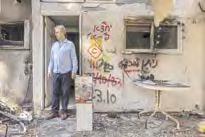
“They wanted prison to be a grave for us, a mill to grind our will, determination and bodies,” Sinwar once told supporters. “But, thank G-d, with our belief in our cause, we turned the prison into sanctuaries of worship and academies for study.”
Hamas, an offshoot of the Muslim Brotherhood, elects its leaders democratically, and that structure was mirrored behind bars. In each prison, one committee was charged with making quotidian decisions — who slept in the top bunk, what to watch during allotted TV hours — while another meted out punishments to
“noW, you’rE sTrong, you h AVE 200 ATomIC WA rhEA ds,” sIn WA r WouLd sAy. “Bu T
WE’LL s EE, mAyBE In A noThEr 10 To 20 y EA rs, you’LL WEA kEn, A nd I’LL ATTACk.”
suspected collaborators, and still others oversaw things such as divvying up money sent by Hamas leaders that could be used to purchase food at the commissary.
An elected “emir,” along with members of a high council called the “haya,” ruled over this structure for limited terms. For much of Sinwar’s time in prison, he alternated as emir with Rawhi Mushtaha, a confidant who had been convicted alongside him for killing collaborators. It was Sinwar’s turn in 2004.
ATthe time, the episode seemed of little consequence. After all, Bitton said, Sinwar was supposed to be serving four life terms.
As a dentist in Israel, Bitton had also trained in general medicine, and was often called upon to assist the three other prison doctors, stitching up wounds or helping with a tricky diagnosis. So, when he emerged from seeing his dental patients that day in early 2004 to find several clearly perplexed colleagues surrounding a disoriented Sinwar, Bitton did what a doctor does. He joined them.
“What’s going on?” he asked the prisoner.
The two men had met on a number of occasions.
Bitton often wandered back to the prisoners’ wings, partly out of curiosity about how some of Israel’s most
fervent enemies thought, and partly because the trust he engendered as a doctor made him a useful intermediary when prison administrators wanted to know what was going on. Just as Sinwar had learned Hebrew, Bitton had taught himself Arabic. He became such a regular presence in the cellblocks that some prisoners suspected, wrongly, that he might be an intelligence plant.
Lately, Bitton had been working to persuade Sinwar and others to cooperate with Israeli researchers studying suicide bombings. But in the examining room, Sinwar didn’t seem to know him.
“Who are you?” Bitton recalled him asking.
“It’s me, Yuval.”
“Wow, I’m sorry — I didn’t recognize you,” Bitton said the prisoner replied, before describing his symptoms.
He would stand for prayer and then fall. As he spoke, he seemed to drift in and out of consciousness. But for Bitton, the most telling sign was Sinwar’s complaint of a pain in the back of his neck. Something is wrong with his brain, the dentist told his colleagues, perhaps a stroke or an abscess. He needed to go to the hospital, urgently.
He was rushed to nearby Soroka Medical Center, where doctors performed emergency surgery to remove a malignant and aggressive brain tumor, fatal if left untreated. “If he had not been operated on, it would have burst,” Bitton said.
A few days later, Bitton visited Sinwar in the hospital, together with a prison officer sent to check the security arrangements. They found the prisoner in bed, hooked up to monitors and an IV, but awake. Sinwar asked the officer, who was Muslim, to thank the dentist.
“Sinwar asked him to explain to me what it means in Islam that I saved his life,” Bitton recalled. “It was important to him that I understood from a Muslim how important this was in Islam — that he owed me his life.”
sIn WA
r rarely, if ever, spoke to Israeli prison authorities. But now he began meeting regularly with the dentist, to drink tea and talk.
They would meet back in the cellblocks, two men with strikingly similar features — cropped, prematurely graying hair; dark, quizzically arched eyebrows; high cheekbones. Bitton, a loquacious, easygoing man, often joshed with the other prisoners, getting them to open up about their families or sports. But with Sinwar, the talk was all business and dogma.
“The conversations with Sinwar were not personal or emotional,” he said. “They were only about Hamas.”
Sinwar knew the Quran by heart, and he coolly laid out his organization’s governing doctrines.
“Hamas sees the land we live on as the holy land, like, ‘This is ours, you don’t have a right to live in this land,’” Bitton said. “It wasn’t political, it was religious.”
Bitton would press him: Was there no chance, then, for a two-state solution?
Never, Sinwar would say. Bitton would respond: Why not?
Because this is the land of Muslims, not for you — I can’t sign away this land.
In a search of his cell, guards had confiscated a handwritten novel that Sinwar finished at the end of 2004, after the surgery. “You couldn’t make a Hollywood movie about it,” Bitton said, laughing. “But it was about the relationship between men, women and the family in Is-
61 THE BALTIMORE JEWISH HOME MAY 30, 2024 WWW.THEBJH.COM A LL PHOTOS BY T HE N EW Y OR k T IMES
Yuval Bitton in his nephew’s destroyed home
lam.” At least one copy was smuggled out; The New York Times found a typed PDF in an online library.
The novel, “The Thorn and the Carnation,” is a coming-of-age story that limns Sinwar’s own life: The narrator, a devout Gaza boy named Ahmed, emerges from hiding during the 1967 Arab-Israeli war to a life under Israeli occupation. In their cruelty, the occupiers cause the “chests of youth to boil like a cauldron.” In retaliation, Ahmed’s friends and family attack them with knives, ambush them with Molotov cocktails and hunt collaborators so as to “gouge out the eyes that the occupier sees us with from the inside.”
Weaved throughout is the theme of the unending sacrifice demanded by the resistance. At university, where he is recruited to Hamas, Ahmed becomes infatuated with a woman he sees walking to and from class. “I am not exaggerating when I say that she truly surpasses the full moon,” he says. Yet, their relationship — chaste and proper according to Muslim values — never develops; the reader never even learns the woman’s name.
“I decided to end my love story, if it can even be called a love story,” the narrator says. “I realized that ours is the bitter story of Palestine, for which there is only room for one love … one passion.”
But if Sinwar, unmarried at the time, ever entertained the notion of an alternative path for himself, he did not share his thoughts with Bitton. (Indeed, even after his release from prison and subsequent marriage, he has said very little publicly on the subject of his own family, except to note that “the first words my son spoke were ‘father,’ ‘mother’ and ‘drone.’”)
Bitton was under no illusion about whom he was dealing with. A prison assessment that Bitton said he helped compile called Sinwar cruel, cunning and manipulative, an authoritative man with “the ability to carry crowds” who “keeps secrets even inside prison amongst other prisoners.”
Still, there was a certain transactional honesty to their conversations. Each man knew the other had an agenda.
Just as Bitton probed to better understand the schisms between Hamas and the other Palestinian factions inside the prison, Sinwar returned again and again to the fissures in Israeli society that he read about in the Hebrew news media: between rich and poor, between Sephardic and Ashkenazi, between secular and Orthodox Jews.
“Now, you’re strong, you have 200 atomic warheads,” Sinwar would say. “But we’ll see, maybe in another 10 to 20 years, you’ll weaken, and I’ll attack.”
In 2006, after Israel’s withdrawal from Gaza, Hamas stunned political observers by winning the largest number of seats in the Palestinian Authority’s legislative elections.
Israeli authorities, worried that the election would help legitimize a group that the United States and European Union had designated a terrorist organization, devised a plan to remind the world of Hamas’ true colors by giving some of its incarcerated leaders a media platform on “60 Minutes” and in an interview with Israeli television. Bitton was tasked with selling the idea to Sinwar, who would have to sign off.
“Speak freely, you can say whatever you want about Israel,” Bitton told Sinwar and other prisoners.

The plan worked, from Bitton’s perspective. When Abdullah Barghouti, who had organized suicide bombings that killed 66 people, was asked on “60 Minutes” whether he regretted his deeds, he readily answered yes. “I feel bad, ’cause the number only 66,” he said. Sinwar, for his part, tried to use his first and only interview with an Israeli television outlet to send a savvier message. With Bitton looking on, he told the interviewer that Israelis should “be scared” about Hamas’ election victory. But, he added in comments that weren’t aired, much depended on what the Israeli government did next. “From our perspective, we have a right that we’re asking from the Israeli leadership,” he said. “We aren’t asking for the town.”
The next year, to great alarm in Israel, Hamas wrested full control over Gaza in a violent power struggle with Fatah, a secular rival political party.
This was the time, Bitton decided, to channel the relationships he had built with Sinwar and other imprisoned Palestinian leaders into a new role, one that would not leave him feeling so conflicted. He applied to become an officer in the Prison Intelligence Service, and after a short course, he was assigned to ketziot prison in 2008. The man who “doesn’t understand the motives and roots of their enemy,” he explained, “will not be able to prevent those organizations from doing what they want.”
BITTon
was quickly thrown into a monumental challenge. Two years earlier, in 2006, an Israeli soldier, Gilad Schalit, had been kidnapped in a daring cross-border raid. Among his captors was none other than Sinwar’s brother.
The kidnapping profoundly shook Israeli society, with its credo that not a single soldier should be left behind. As the Israeli government, working through a back channel with a team of international intermediaries, attempted to negotiate a prisoner swap, Bitton was tasked with using his connections to imprisoned Hamas leaders to glean intelligence on what they would accept.
By 2009, Israel had agreed in principle to exchange 1,000 Palestinian prisoners for Schalit. Sinwar “was managing the negotiations from inside the prison with a group of brothers who were also with him,” according to Hamad, the informal Hamas spokesperson, who was involved in the negotiations.
There was only one problem: Despite being on the
list, Sinwar didn’t think the deal was good enough, according to Gerhard Conrad, a retired German intelligence officer involved in brokering the Schalit deal.
Sinwar was insisting on freeing “the so-called impossibles,” Conrad said. Those were the men serving multiple life sentences, men such as Barghouti and Abbas al-Sayed, who had masterminded the Passover suicide attack that had killed 30 people at the Park Hotel.
Saleh Arouri, a founder of Hamas’ armed wing, the Qassam Brigades, and a leader of prisoners from the West Bank, approached Bitton. Would he help push against Sinwar’s obstinacy?
Arouri “understood they had to compromise — that we would not release everyone,” Bitton said. “He was more pragmatic.”
Recognizing that the rift between Sinwar and Arouri could potentially be used to advance the Schalit negotiations, Bitton got his bosses to sign off on a plan aimed at deepening the division. At Arouri’s request, prison officials brought together 42 influential West Bank inmates from three separate prisons so that Arouri could win them to his side.
But pressuring Sinwar turned out to be much harder.
Bitton saw what he was up against in 2010, when, amid the stalled Schalit negotiations, Sinwar tried to compel all 1,600 Hamas prisoners to join a hunger strike that would have left many of them dead. The goal wasn’t even to free prisoners, just to release two from long-term solitary confinement. In that moment, Bitton said, he realized there would never be a Schalit deal as long as Sinwar remained in the way.
“He was willing to pay a heavy price for principle,” Bitton said, “even if the price wasn’t proportional to the goal.”
Even after the Schalit negotiators managed to persuade the Israelis in 2011 to release additional prisoners, bringing the total to 1,027 — including some, though not nearly all of the “impossibles” — Sinwar remained opposed.
But by this point, Arouri had been released from prison and was a member of the Hamas negotiating team, led by Ahmad Jabari, a top commander who had led the raid that captured Schalit. Under pressure from Egyptian mediators, the team concluded that this was as good a deal as it was going to get.
Sinwar’s authority had been diluted. But just to be sure, the Israelis put him in solitary confinement until the deal was done. (Arouri was killed in an Israeli airstrike this past January.)
On Oct. 18, 2011, Bitton stood in the yard of ketziot prison, watching as Sinwar boarded a bus to Gaza. Having witnessed the persuasive power of Sinwar’s leadership up close, Bitton said he had urged the negotiators not to free him. But he was overruled, he said, because Sinwar “didn’t have as much Jewish blood on his hands” as some of the others.
“I thought you need to look at the capabilities of the prisoner to use their abilities against Israel and not just what he did — his potential,” Bitton said.
In news video footage from that day, Sinwar does not look all that pleased either, scowling on a makeshift stage in central Gaza City as Ismail Haniyeh, then leader of Hamas in Gaza, gleefully waves to the thousands gathered to celebrate the prisoners’ release. Hours later, in
62 THE BALTIMORE JEWISH HOME MAY 30, 2024 WWW.THEBJH.COM
Yahya Sinwar and Dr. Yuval Bitton at the Beersheba complex during negotiations for the Schalit prisoner deal
an interview with Hamas’ Al-Aqsa TV, a defiant Sinwar made a promise.
“We shall spare no efforts to liberate the rest of our brothers and sisters,” he said. “We urge the Qassam Brigades to kidnap more soldiers to exchange them for the freedom of our loved ones who are still behind bars.”
“He told us what he was going to do,” Bitton said. “We didn’t want to listen.”
ABouT
6:30 a.m. Oct. 7, Bitton’s nephew, Tamir Adar, woke up in Nir Oz, a kibbutz less than 2 miles from the Gaza border. Adar, 38, worked as a farmer, and he normally rose early so that he would have time to enjoy the long summer afternoons, drinking beer as he watched his daughter and son splash around in the community pool.
That morning, as air raid sirens blared, rockets pierced the sky and sporadic gunfire ricocheted off walls, Adar left his wife and children in their house’s small safe room and went out to join the kibbutz’s armed emergency response team.
At 8:30 a.m., he sent his wife a WhatsApp message: She should not open the safe-room door, not even if he came pleading to be let in. The kibbutz had been overrun.
At 4 p.m., soldiers finally arrived and called residents out of their safe rooms. Adar was nowhere to be found. His mother, Yael, called her brother, Bitton: “Tamir has disappeared.”
Roughly 100 Nir Oz residents — a quarter of the population — had been killed or kidnapped in the Hamas raid. The world quickly knew that Adar’s paternal grandmother, 85-year-old Yaffa Adar, was among them, as viral video showed armed militants carrying her to Gaza in a stolen golf cart. It would be three weeks before Israeli officials could confirm that Tamir Adar had been taken hostage, too.
Before, his mother worked as the administrator for a school district near the Gaza border. Now, she gave herself over to the hostages’ cause, attending marches and demonstrations to pressure the government into striking a deal with Hamas for their release.
“One day you’re hopeful and the next in despair,” she said. “One day you’re crying and the next you’re able to gather yourself.”
She wondered whether she should ask her brother to leverage his connections, but decided against it. “What could I tell him?” she said. “Call Sinwar?”
In the years since the Schalit deal, Bitton had climbed the ranks of the Israeli Prison Service, becoming the head of its intelligence division and then a deputy commander overseeing 12 prisons before retiring in 2021. Sinwar had traced a parallel arc. After his release, he was elected to a role akin to Hamas defense minister. And in 2017, he was elected leader of Hamas in Gaza, overseeing all aspects of life in Gaza.
It hadn’t escaped Bitton’s notice that the Hamas assault came at a time of deep division in Israel, the nation wracked by protests over Israeli Prime Minister Benjamin Netanyahu’s efforts, demanded by the right-wing parties crucial to his political survival, to dilute the power of Israel’s Supreme Court. It was precisely the type of schism that Sinwar had spoken of years before at Beersheba, when he said he would attack at a time of internal strife.

Bitton held small hope for his nephew’s release. For Sinwar, the hostages were a means to an end — freeing the Palestinian prisoners left behind in the Schalit deal and putting the Palestinian cause back on the world stage. Even if Sinwar knew who his nephew was, Bitton said, “at the end, he looks at us as Jews.”
Still, in one of their last conversations, on the day Sinwar was freed, the Hamas leader had again thanked him for saving his life. Sinwar had even asked for his phone number, although Bitton had to refuse because prison employees are forbidden to communicate with Hamas leaders on the outside. He believed that Sinwar would feel bound by a kind of code, and that if he was
“IT WAs ImPorTA nT To hIm Th AT I undErs Tood from A musLIm hoW ImPorTA nT ThIs WAs In IsLA m — Th AT hE oWEd mE hIs LIfE.”
made aware that Hamas held Bitton’s nephew, he at least would not allow him to be mistreated.
“Beyond the fact that we are enemies, at the end of the day, there is also his personal outlook,” Bitton said. “In my opinion, he would treat him the same way I did, saving his life despite being an enemy.”
Several weeks after the Hamas attack, in the hope that Sinwar was still an avid follower of Israeli news media, Bitton decided to give a television interview. In it, he said only that he had been part of a team that had diagnosed Sinwar decades before and that his nephew was among the hostages. (In other interviews, he similarly downplayed his role, because, he said, he was worried about how he might be perceived by a nation in mourning.)
In late November, Adar’s grandmother was released in a weeklong cease-fire deal that saw 105 of the hostages freed, mostly women and children. What Bitton knew but could not say in his family’s moment of joy was that Sinwar would hold on to military-age men such as Adar until the very end, to guarantee his own survival.
“Can I tell my sister that they’re releasing Yaffa Adar, Tamir’s grandma, and that that will be the last release and Tamir will remain there? I can’t say it, but I know him and I know what he’ll do,” Bitton said. “That’s why
I stayed silent, but I’m eating my heart out.”
Yet, there was reason to believe that his nephew was still alive. In the wake of Bitton’s TV interview, Israeli intelligence learned that Sinwar was asking about Adar’s well-being and that subordinates had assured him that he was all right.
It turned out the subordinates had asked after the wrong person. On Jan. 5, the government told the family what new intelligence showed: Wounded while defending his kibbutz, Adar had apparently died not long after being dragged into Gaza, one of at least 35 hostages believed to be dead, among roughly 125 still being held.
Bitton returned to Nir Oz on a sunny winter morning. Blackened buildings peeked out between columnar cactuses, deafening booms from artillery shells interrupted chirping parrots and cooing doves, and an acrid smell still hung in the air. “The smell of death,” Bitton said, wrinkling his nose.
Rounding a corner, he stopped. “That’s his blood,” he said, his face tightening in grief as he pointed toward a concrete wall that once hid the kibbutz’s dumpsters, now a dark-stained marker of his nephew’s last stand. And nearby, a small memorial, a fleet of toy tractors.
“Do you see what’s lost?” Bitton said. “It’s like that here. No one remains, just birds and stories.”
These days, Bitton meets regularly with the hostages’ families, sharing everything he learned about Sinwar, to help them manage expectations.
In recent weeks, international negotiators have pressed Israel and Hamas to accept a deal that, in its first phase, would see some of the hostages exchanged for many more Palestinian prisoners and a temporary cease-fire, according to officials familiar with the process. But Hamas has held out for a total cessation of hostilities that would leave it in charge of Gaza, a red line for the Israeli government.
“I tell the families not to get their hopes up,” Bitton said. “In this situation, there is no chance.”
BITT on
and his sister have revisited, over and again, that long-ago day in the prison infirmary. She said they try to laugh at the “absurdity” of it all. “On the one hand, my brother saved a life, and on the other, his sister lost her boy to the same person he saved.”
She assures him there was nothing else he could have done.
“These are our values. Yuval never would have acted differently, never, and neither would I,” she said. “But in the end, we were screwed.”
First and foremost by their own government, they said. Hamas is Hamas, as Bitton put it. “With Sinwar, I know he wants to destroy us,” Yael Adar echoed. “My greatest anger is that there was no one to defend our borders.”
Not everyone in Israel seems to see it that way. Sitting together in a cafe in Eilat, a town on the Red Sea where the survivors of Nir Oz were first relocated, brother and sister were approached by a stranger. The woman fixed her gaze on Bitton, apparently recognizing him from his interview on TV. She had a question.
“Why did you save him?” she asked. “Why?”
This article originally appeared in The New York Times.
63 THE BALTIMORE JEWISH HOME MAY 30, 2024 WWW.THEBJH.COM
Sinwar, after being released in the Schalit deal, October 19, 2011
Your Money
Was the 401(k) a Mistake?
By Allan Rolnick, CPA

Retirement sure has changed, hasn’t it? A century ago, it meant slowing down a bit as you got old and frail but still working until you dropped. In the 1950s and ‘60s, it meant collecting a gold watch and living off a company-sponsored pension along with health benefits and Social Security. But, supporting retired workers is expensive, and companies grew to resent those obligations. So, in 1980, a Philadelphia benefits consultant named Ted Benna realized that Section 401(k) of the Revenue Act of 1978 could let his employees “defer” part of their paycheck into a deferred compensation plan. Just two years later, 7.5 million American workers were using the new plan to save. Today, there are over 710,000 plans covering more than 70 million Americans, holding over $7 trillion in assets.
Current conventional wisdom holds that the best way to save for retirement is to contribute as many tax-deductible dollars as you can to your 401(k) during your working years when you’re earning your highest income and paying your highest taxes. Invest it as aggressively as you can in the stock market or pick something called a “target date fund” that makes investment choices for you based solely on your current age. Then, withdraw your savings and pay tax at lower retirement rates to finance
golden years full of Florida sunsets, grandchildren, and pickleball. (Try not to drive your neighbors nuts with the sound of the ball hitting the paddle!)
Now, a new breed of economists and investment professionals are asking themselves, was it all a mistake? Increasingly, the answer is “yes.”
Now, Ted Benna calls his invention a “monster” and says he regrets how employers have made it their employees’ primary savings vehicle. “It was never designed to be what it is today,” he says. Larry Fink, the chairman of BlackRock money management firm, criticizes it as “a shift from financial certainty to finan-
Today, there are over 710,000 plans covering more than 70 million Americans, holding over $7 trillion in assets.
Investing isn’t easy – if it were, everyone would succeed. Investors face three primary challenges to securing results: market volatility, fees, and taxes. Employees investing in 401(k)s (or their nonprofit cousins, 403(b)s and 457s) have to navigate all of those challenges themselves. How many classes did you take on retirement planning in high school or college? And if your name isn’t something like “Chadwick Cabot Lodge III,” Mummy and Daddy probably never sat you down to discuss it.
cial uncertainty.” And plenty of observers criticize the 401(k)-industrial complex of driving wealth inequality.
Let’s take a closer look at just one of those fundamental assumptions underlying the conventional wisdom: the notion that taxes will be higher today, when the money is going into the plan, than tomorrow, when it’s coming out. Will that really be true? Today’s national debt stands at $34.8 trillion, and we’re adding a trillion more every hundred days. How
confident are you that tax rates won’t go up in the future? (What about your children inhering your account when they’re in their highest-taxed years and paying more on the money than you ever would have?) If they do, millions of Americans will be lighting the fuse on a tax time bomb with every paycheck. Yes, they can choose a “Roth” option that flips the usual arrangement in favor of nondeductible contributions today and tax-free income tomorrow. But even guessing right on tax rates still means confronting market volatility and the punishing, sometimes-hidden Wall Street management fees.
Today, financial experts and advocates are looking at potential 401(k) alternatives with higher mandatory contributions and stronger guarantees. Long-term, those could go a long way towards closing the retirement savings gap. And we’re happy to help you craft the most tax-efficient plan for your own golden years. Call us before you book that pickleball court!
Allan J Rolnick is a CPA who has been in practice for over 30 years in Queens, NY. He welcomes your comments and can be reached at 718-896-8715 or at allanjrcpa@aol.com.
64 THE BALTIMORE JEWISH HOME MAY 30, 2024 WWW.THEBJH.COM





































































JOIN OUR WALL OF FAME 410.775.5440 | www.amfcreative.com | hello@amfcreative.com BRANDING WEBSITES GRAPHIC DESIGN CAMPAIGNS
School of Thought
By Etti Siegel


Q:Dear Etti, I am so nervous about graduating high school. I have been with most of my classmates since preschool and some of my new friends since 9th grade.
Instead of enjoying the end of my high school experience, these feelings are ruining my sleep and ruining my last few weeks at school.
I don’t think anyone realizes how nervous I am because I am walking around smiling and acting normal. Do you have any advice for me?
-Helpless High Schooler
A:Dear High Schooler, While this might not be the correct forum for this letter, as this is really a column about the connection between home and school, I am choosing to answer so that the teachers and parents who read this column will know that many students feel as you do, and they should look out for the teens who are struggling as you are, to help and support them if they can.
For 13+ years you have had your life scheduled for you. There were ups and there were downs, but the uncertainties were within a set structure you were familiar with. You might not have known who your teacher was going to be, or if the school was mixing up the classes which girls would be in your class, but overall, you knew what the days and weeks ahead looked like.
Now, you are graduating. I hope I am not jumping to conclusions when I guess you are female. (I get more letters from females .) Even if you are going to a seminary here or abroad, life is about to change in a big way. And that can be very unsettling.
There is actually a term called completion anxiety. “Completion anxiety is a type of anxiety that people experience when they are close to finishing a project or task” (choosingtherapy.com). Sometimes completion anxiety occurs because of the “anticipatory fear of what is to come once the task is completed or the work that will be needed to finish the task” (ibid).
Children of all ages and stages struggle with the end of the school year.
It is exciting to finally graduate high school, but there are so many uncertainties ahead! Fear of the unknown, lack of structure and guidance, changing relationships, separation anxiety, and other people’s expectations of you can all play a big part in how you are feeling right now.
The first thing you might want to do is try to lessen the uncertainty of the unknown. If you are going to seminary, see if you can connect to others who went there already and ask them to paint a picture of what the days look like. If you are going to college or starting to work, do the same.
Ask around about shiurim and classes that young girls who are post-high school or seminary attend. Most larger communities have such classes weekly. Even if you did not love such lectures when you were in high school, suddenly, you might find that when you choose to go to a class as an adult you enjoy it more. Not only does this help you create a set schedule for yourself, this is also a great way to keep up with classmates and make new friends.
If you see that you are feeling more than just regular sadness and nervousness over this change, and it does not go away over time and it lasts more than a few weeks, it might be wise to make sure adults in your life
are aware that you are struggling. Learning how to deal with change is a big part of adulthood and getting the tools to help you not only accept it but enjoy it would help you now and in the future.
Thanks for writing in. I hope this was helpful.
- Etti
P.S. Children of all ages and stages struggle with the end of the school year. Many parents think that the beginning of the school year is hard, but for many children, the end of the school year can be extremely anxiety-producing.
Teachers talk a lot about preparing the class for the next year and that can cause some children to feel very anxious and overwhelmed.
When a person feels anxious, it means the body is feeling threatened. Fight, flight, or freeze is the natural response to such feelings. In younger children, this might look like refusing to go to school, having a tantrum when you insist on having them go to school or do homework, or misbehaving in class. A child who usually gets along with his/her peers might suddenly be biting or hitting.
Anxious children are not bad children. They need the adults in their lives to help them with the overwhelming feelings they are experiencing. (Read https://www. heysigmund.com/anxiety-or-aggression-children for a lot more interesting and helpful information on this subject.)
If your child seems to be anxious, clarify and normalize their feelings, and build them up. If you have confidence in them, often they will have confidence in themselves.
Mrs. Etti Siegel holds an MS in Teaching and Learning/Educational Leadership and brings sound teaching advice to her audiences culled from her over 35 years of teaching and administrative experience. She is an Adjunct at the College of Mount Saint Vincent/Sara Shenirer. She is a coach and educational consultant for Catapult Learning, is a sought-after mentor and workshop presenter around the country, and a popular presenter for Sayan (a teacher-mentoring program), Hidden Sparks, and the Consortium of Jewish Day Schools. She is a frequent contributor to Hamechanech Magazine and The Journal for Jewish Day School leaders. She will be answering your education-based questions and writing articles weekly for The Jewish Home. Mrs. Siegel can be reached at ettisiegel@gmail.com.
66 THE BALTIMORE JEWISH HOME MAY 30, 2024 WWW.THEBJH.COM

67 THE BALTIMORE JEWISH HOME MAY 30, 2024 WWW.THEBJH.COM 6307 Pimlico Rd | Baltimore, MD 21209 | 410-218-5124 | evemessing@verizon.net

























to The Candy Store Win $10 HEY KIDS! Take a picture with your artwork and submit it to thebjh.com/kids to enter a raffle for a chance to win $10 to The Candy Store! See your picture in print the following week! Two winners • every week • Submissions due Sunday, June 2nd. Download extra coloring sheets from thebjh.com

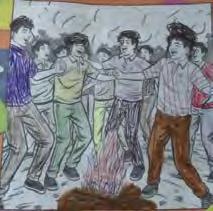




Note:
69 THE BALTIMORE JEWISH HOME MAY 30, 2024 WWW.THEBJH.COM
Eliana Gabay, 7
Chaya Swiatycki, 4
Elisheva, 6
Chezky, 8
Ayelet Khoshnood, 9
Chaim Swiatycki, 7
Not all submission have been published. Keep sending in your artwork for another chance to be featured!




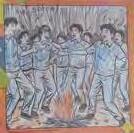





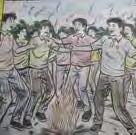
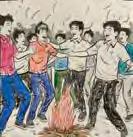

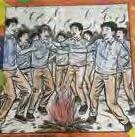
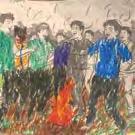
Note: Not all submission have been published. Keep sending in your artwork for another chance to be featured!
70 THE BALTIMORE JEWISH HOME MAY 30, 2024 WWW.THEBJH.COM
Kayla J, 10
Natan Moshe, 3.5
Nati Coleman, 5
Riki Kleiner
YM Baruch, 5
Yitzy Delrahim, 9
Mayer, Bella & Zeke Scheinfeld 6, 7 & 7
Yardena Markowitz, 5
Yeshaya Goldstein, 4
Ava Eagle, 7
Asher L, 8
Leo, 4
Tali Stern, 4
Sara, 10
Emmie Stern, 7
In The K tchen
Southwestern Corn Soup
Yields about 8 servings
 By Naomi Nachman
By Naomi Nachman
I love soup any time of the year;. I use seasonal ingredients to make a delicious pot of soul-warming soup. This soup can be made with fresh summer corn during the summer season; the rest of the year you can use frozen kernels. To make it dairy, you can swirl in a dollop of sour cream and add this to your Shavuos menu.
Ingredients
◦ 2 Tablespoons canola oil
◦ 1 medium onion, diced
◦ 2 (14-16 ounce) bags frozen corn kernels
◦ 1 Tablespoon kosher salt
◦ 1 teaspoon cumin
◦ 1 teaspoon chili powder
◦ 1 teaspoon smoked paprika
◦ 4 cups vegetable broth
◦ 1 cup water
◦ 1 Tablespoon lime juice
◦ Crunchy chickpea croutons, for topping

Preparation
1. Heat oil in a large pot over medium heat. Add onion; sauté, stirring occasionally, for about 10 minutes, until starting to get some color.
2. Add corn, salt, cumin, chili powder, and smoked paprika; stir to combine. Continue to cook for 5-7 minutes, until fragrant and corn is softened.
3. Add broth and water; raise heat to high. Bring to a boil, then reduce heat and let soup simmer for about 1 hour.
4. Remove from heat. Blend, using an immersion blender, for about 3 minutes, until completely smooth. Stir in lime juice.
5. To serve, fill a bowl with soup, then place a couple of spoonfuls of chickpea croutons in the center.
Cook’s note: I typically buy the Good Bean brand of crunchy chickpeas from Gourmet Glatt to use as a topping.
Naomi Nachman, the owner of The Aussie Gourmet, caters weekly and Shabbat/ Yom Tov meals for families and individuals within The Five Towns and neighboring communities, with a specialty in Pesach catering. Naomi is a contributing editor to this paper and also produces and hosts her own weekly radio show on the Nachum Segal Network stream called “A Table for Two with Naomi Nachman.” Naomi gives cooking presentations for organizations and private groups throughout the New York/New Jersey Metropolitan area. In addition, Naomi has been a guest host on the QVC TV network and has been featured in cookbooks, magazines as well as other media covering topics related to cuisine preparation and personal chefs. To obtain additional recipes, join The Aussie Gourmet on Facebook or visit Naomi’s blog. Naomi can be reached through her website, www.theaussiegourmet.com or at (516) 295-9669.
71 THE BALTIMORE JEWISH HOME MAY 30, 2024 WWW.THEBJH.COM

410.775.5440 | amfcreative.com




TUESDAY



BRANDING WEBSITES GRAPHIC DESIGN CAMPAIGNS Postmaster: Please deliver by Friday May 31 See pg pg 20 YESHIVAS MIR
YERUSHALAYIM
EVENING ד”פשת רייא ז''כ | JUNE 4, 2024 8:30 PM 3401 LABYRINTH RD AT THE HOME OF M R & M R S D O V O C K E N THIS TUESDAY GUEST SPEAKER
FRAND SHLITA
YESHIVAS
םילשורי רימ תבישי שאר HAGAON HARAV NACHMAN LEVOVITZ SHLITA WITH THE PARTICIPATION OF YESHIVAS MIR YERUSHALAYIM 5227 New Utrecht Avenue, Brooklyn, New York 11219 P 718.972.0500 F 718.851.1999 E info@themir.org W themir.org BALTIMORE הבהאל ונבבל דחיו
RABBI YAKOV
REBBI, MESIVTA
CHOFETZ CHAIM
























































































































 By Rabbi Zvi Teichman
By Rabbi Zvi Teichman














































































































































































